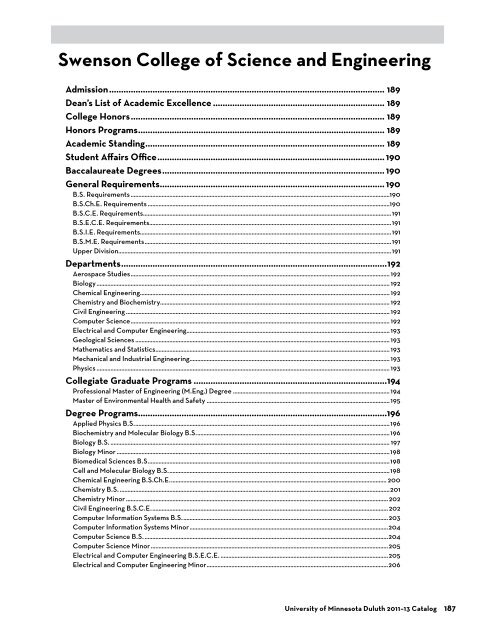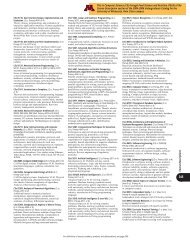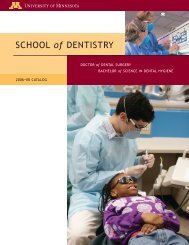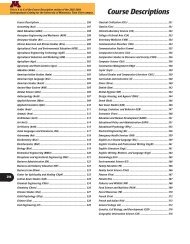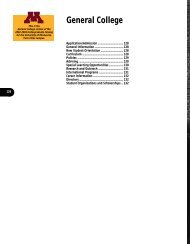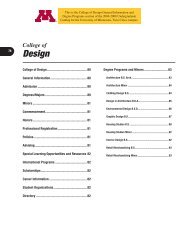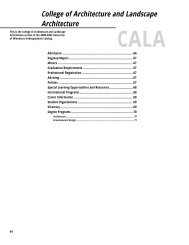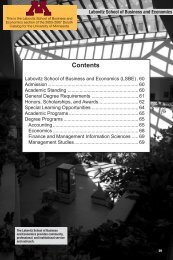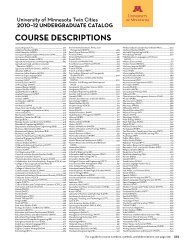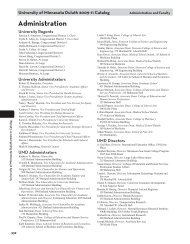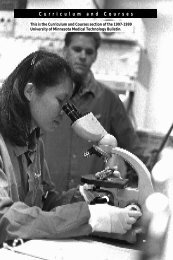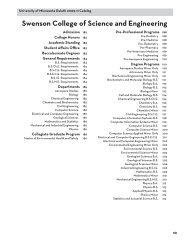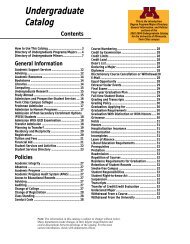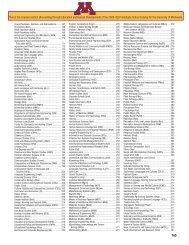Swenson College of Science and Engineering - University Catalogs
Swenson College of Science and Engineering - University Catalogs
Swenson College of Science and Engineering - University Catalogs
You also want an ePaper? Increase the reach of your titles
YUMPU automatically turns print PDFs into web optimized ePapers that Google loves.
<strong>Swenson</strong> <strong>College</strong> <strong>of</strong> <strong>Science</strong> <strong>and</strong> <strong>Engineering</strong>Environmental <strong>Science</strong> B.S. .....................................................................................................................................................206Environmental <strong>Science</strong> Minor..................................................................................................................................................208Geological <strong>Science</strong>s B.S............................................................................................................................................................208Geological <strong>Science</strong>s Minor.......................................................................................................................................................209Industrial <strong>Engineering</strong> B.S.I.E..................................................................................................................................................209Mathematics B.S........................................................................................................................................................................... 212Mathematics Minor...................................................................................................................................................................... 213Mechanical <strong>Engineering</strong> B.S.M.E ........................................................................................................................................... 213Physics B.S...................................................................................................................................................................................... 215Physics Minor................................................................................................................................................................................. 215Statistics <strong>and</strong> Actuarial <strong>Science</strong> B.S....................................................................................................................................... 216188 Information in this PDF is current as <strong>of</strong> February 2011. For up-to-date information, www.catalogs.umn.edu/umd.
DepartmentsThe Department <strong>of</strong> Computer <strong>Science</strong> provides instruction<strong>and</strong> research experiences for undergraduate <strong>and</strong> graduatestudents in preparation for careers in industry or forcontinuing on in graduate school. The department alsoprovides instruction in computer literacy <strong>and</strong> s<strong>of</strong>twaredesign for non-major students as part <strong>of</strong> a liberal education.Electrical <strong>and</strong> Computer <strong>Engineering</strong>Email: ece@d.umn.eduWebsite: www.d.umn.edu/ecePr<strong>of</strong>essors: Stanley Burns, Taek Mu Kwon, MarianStachowicz, Jiann-Shiou Yang (department head); AssociatePr<strong>of</strong>essors: Christopher Carroll, Mohammed Hasan, ImranHayee; Assistant Pr<strong>of</strong>essors: Jing Bai, Nisha Kondrath,Hua Tang; Instructors: Tom Ferguson, Scott NorrThe goals <strong>of</strong> the Department <strong>of</strong> Electrical <strong>and</strong> Computer<strong>Engineering</strong> are to provide high quality educationalopportunities in electrical <strong>and</strong> computer engineering forstudents by delivering a program with a strong h<strong>and</strong>s-onlaboratory <strong>and</strong> design component in conjunction with athorough foundation in theory; <strong>and</strong> to provide students withthe tools <strong>and</strong> skills to be major lifelong contributors to theirpr<strong>of</strong>essions <strong>and</strong> society as a whole.Geological <strong>Science</strong>sEmail: geol@d.umn.eduWebsite: www.d.umn.edu/geologyPr<strong>of</strong>essors: Erik T. Brown, Steven M. Colman, John W.Goodge, Vicki L. Hansen, Timothy B. Holst, Thomas C.Johnson, Howard D. Mooers, Ronald L. Morton (departmenthead) ; Associate Pr<strong>of</strong>essors: Christina Gallup, PenelopeMorton, John B. <strong>Swenson</strong>, Nigel J. Wattrus; AssistantPr<strong>of</strong>essor: Karen Gran; Instructor: Susan HartleyThe Department <strong>of</strong> Geological <strong>Science</strong>s <strong>of</strong>fers threeundergraduate programs: 1) a bachelor <strong>of</strong> science programproviding training for a career as a pr<strong>of</strong>essional geologist,which usually requires graduate study (For studentsinterested in resource geology the department <strong>of</strong>fers amineral exploration <strong>and</strong> mining option to the bachelor <strong>of</strong>science.); 2) a liberal arts bachelor <strong>of</strong> arts program throughthe <strong>College</strong> <strong>of</strong> Liberal Arts; <strong>and</strong> 3) a program for thoseinterested in teaching earth sciences through the <strong>College</strong> <strong>of</strong>Education <strong>and</strong> Human Service Pr<strong>of</strong>essions.Mathematics <strong>and</strong> StatisticsEmail: math@d.umn.eduWebsite: www.d.umn.edu/mathPr<strong>of</strong>essors: Dalibor Froncek, Joseph A. Gallian, RichardF. Green, Barry R. James, Kang L. James, Zhuangyi Liu(department head), Bruce Peckman, Ronald R. Regal,Harlan W. Stech; Associate Pr<strong>of</strong>essors: Guihua Fei, JohnR. Greene, Carmen Latterell, Kathryn E. Lenz, Robert L.McFarl<strong>and</strong>, Yongcheng Qi, Steven A. Trogdon; AssistantPr<strong>of</strong>essors: Diana Colt, Marshall Hampton; Instructors:R<strong>and</strong>i Crenna, Mingqian Duan, Deanna L. Green, KatherineNiedzielski, Chad Pierson, Angela M. SharpThe Department <strong>of</strong> Mathematics <strong>and</strong> Statistics <strong>of</strong>fersundergraduate degree programs in mathematics <strong>and</strong>statistics/actuarial science. These programs prepare studentsfor careers in business, industry, government, <strong>and</strong> teaching,as well as for graduate studies in mathematics, statistics, <strong>and</strong>biostatistics.Mechanical <strong>and</strong>Industrial <strong>Engineering</strong>Email: mie@d.umn.eduWebsite: www.d.umn.edu/miePr<strong>of</strong>essor: Richard R. Lindeke; Associate Pr<strong>of</strong>essors:Emmanuel U. Enemuoh, Daniel N. Pope, Ryan G. Ros<strong>and</strong>ich(department head), Xun Yu; Assistant Pr<strong>of</strong>essors: SeraphinC. Abou, Bryan Booker, Hongyi Chen, Robert Feyen, AlisonHoxie, Debao Zhou; Instructors: Jose Carrillo, JacobDryke, David Keranen, Ryan Taylor, Heidi ZierdenThe Department <strong>of</strong> Mechanical <strong>and</strong> Industrial <strong>Engineering</strong><strong>of</strong>fers accredited bachelor <strong>of</strong> science degrees in mechanicalengineering <strong>and</strong> industrial engineering to prepare graduatesto succeed in industrial careers. The department has a strongcommitment to undergraduate education; class sizes aremoderate, laboratory sections are small, <strong>and</strong> the majority <strong>of</strong>lectures <strong>and</strong> lab sections are taught by our dedicated, awardwinning faculty. Many courses have a h<strong>and</strong>s-on laboratorycomponent where students get practical experience witha wide variety <strong>of</strong> industry-grade equipment <strong>and</strong> s<strong>of</strong>twaretools in our excellent facilities. The department also <strong>of</strong>fersunique opportunities for study abroad through a strategicpartnership with Luleå <strong>University</strong> <strong>of</strong> Technology in Sweden.PhysicsEmail: phys@d.umn.eduWebsite: www.d.umn.edu/physicsPr<strong>of</strong>essors: John R. Hiller, Michael Sydor; AssociatePr<strong>of</strong>essors: Jay A. Austin, Alec T. Habig (department head);Assistant Pr<strong>of</strong>essors: Richard W. Gran, Sergei Katsev,Jonathan Maps; Instructor: Darrin E. JohnsonThe Department <strong>of</strong> Physics <strong>of</strong>fers two bachelor <strong>of</strong> sciencedegrees that provide pr<strong>of</strong>essional preparation in pure <strong>and</strong>applied physics as well as a liberal arts degree (B.A.).Students are encouraged to participate in research, withemphases in experimental high energy physics <strong>and</strong> particleastrophysics; limnological research, including observationalstudies <strong>and</strong> modeling <strong>of</strong> lakes; <strong>and</strong> computational physics.Additional faculty interests include optics <strong>and</strong> condensedmatter physics. The department also <strong>of</strong>fers courses requiredfor other science <strong>and</strong> engineering programs.<strong>University</strong> <strong>of</strong> Minnesota Duluth 2011–13 Catalog193
<strong>Swenson</strong> <strong>College</strong> <strong>of</strong> <strong>Science</strong> <strong>and</strong> <strong>Engineering</strong>Collegiate GraduateProgramsPr<strong>of</strong>essional Master <strong>of</strong> <strong>Engineering</strong>(M.Eng.) DegreeThe Pr<strong>of</strong>essional Master <strong>of</strong> <strong>Engineering</strong> emphasizes thepractice <strong>of</strong> engineering in either the private or public sector.The program focuses on developing competencies in theareas <strong>of</strong> engineering design, problem solving, <strong>and</strong> practicebeyond what can be achieved in earning a bachelor <strong>of</strong> sciencedegree in a given engineering discipline.An M.Eng. graduate student is expected to have a focus<strong>and</strong> degree designation in one <strong>of</strong> the core UMD disciplines<strong>of</strong> chemical engineering, civil engineering, electrical <strong>and</strong>computer engineering, industrial engineering, or mechanicalengineering.Faculty are members <strong>of</strong> the Departments <strong>of</strong> Chemical<strong>Engineering</strong>, Civil <strong>Engineering</strong>, Electrical <strong>and</strong> Computer<strong>Engineering</strong>, <strong>and</strong> Mechanical <strong>and</strong> Industrial <strong>Engineering</strong>.Admission RequirementsProspective students must have:• Completed an undergraduate degree in an engineeringprogram, or upon approval by the SCSE M.Eng. director<strong>of</strong> graduate studies, in a related discipline, e.g. computerscience, physics, etc.• Earned an undergraduate GPA <strong>of</strong> 3.00 (on a 4.00 scale)for admission. This preferred performance minimum <strong>of</strong>3.00/4.00 GPA must be from an ABET accredited programor equivalent. Industrial experience <strong>and</strong> pr<strong>of</strong>essionallicensure will be considered for applicants with a gradepoint less than the preferred minimum• Provided two letters <strong>of</strong> recommendation—academic <strong>and</strong>/or pr<strong>of</strong>essional references.For international applicants whose native language is notEnglish, a TOEFL score preferred performance minimum is213 on the computer-based test.The GRE score is recommended but not required.Application ProceduresUse the web form to apply at www.d.umn.edu/scse/degrees/MEng/application.html <strong>and</strong> follow theinstructions for submittal. A downloadable PDF is alsoavailable if you prefer, <strong>and</strong> should be sent to:Director <strong>of</strong> Graduate Studies, M.Eng. Program<strong>Engineering</strong> Building 140<strong>Swenson</strong> <strong>College</strong> <strong>of</strong> <strong>Science</strong> <strong>and</strong> <strong>Engineering</strong>1303 Ordean Court<strong>University</strong> <strong>of</strong> Minnesota DuluthDuluth, MN 55812Degree <strong>and</strong> Course RequirementsThe M.Eng. degree program is primarily a courseworkprogram with a minimum <strong>of</strong> 3 credits <strong>and</strong> a maximum <strong>of</strong> 6credits allocated to a design project to be arranged betweenthe departmental adviser <strong>and</strong> student. The 30-credit requiredminimum includes 14 credits at 5xxx or higher <strong>and</strong> a cap <strong>of</strong>6 credits on 4xxx courses. There is no requirement for a finalexam beyond the exams in individual course.Deviation from the table below must be agreed upon by thedepartment adviser <strong>and</strong> student. The resultant program <strong>of</strong>study must then be approved by the department, the SCSEM.Eng. director <strong>of</strong> graduate studies <strong>and</strong> forwarded to theUMD Office <strong>of</strong> Graduate Education for final approval.All M.Eng. graduate students will have a departmentaladviser. Non-faculty, including members <strong>of</strong> the industrialcommunity, are invited to collaborate <strong>and</strong> work with thestudent <strong>and</strong> departmental adviser.Any project report or presentation requirement within the3–6 credit <strong>of</strong> the engineering course project are at the option<strong>of</strong> the departmental adviser <strong>and</strong> department.Grading SystemThe grading system for the M.Eng. follows the <strong>University</strong> <strong>of</strong>Minnesota Graduate School policies <strong>and</strong> procedures.Course Requirements Semester Credits Course LevelMajor plan department: ChE, CE, ECE,ME (within MIE), IE (within MIE)<strong>Engineering</strong> course project within themajor plan department: ChE, CE, ECE,ME (within MIE), IE (within MIE)12 minimum 5xxx or 8xxx*, selected 4xxx**3 to 6 5xxx to be arranged by thedepartmental adviser <strong>and</strong> studentOther engineering*** 6 to 9 Selected 4xxx, 5xxx, 8xxxNon-engineering**** 3 minimum Graduate courses—approved listTOTAL APPROVED CREDITS 30 minimum* In consultation with their department adviser, students maychoose to include one or more 8xxx courses in their program<strong>of</strong> study. It should be noted that even though there are norequirements for 8xxx courses, M.Eng. students who meet thecourse prerequisites for 8xxx courses in computer science,electrical <strong>and</strong> computer engineering, engineering management,<strong>and</strong> geological science will be encouraged to include thesecourses in their degree program.** Identical/similar courses taken as part <strong>of</strong> an undergraduatedegree either at UMD or at another institution cannot berepeated or applied as part <strong>of</strong> the M.Eng. program. Thedepartmental adviser <strong>and</strong> SCSE director <strong>of</strong> graduate studies willwork with the student on this issue when setting up the program<strong>of</strong> study*** Courses selected in collaboration with the department adviser.**** Non-engineering courses would consist <strong>of</strong> courses approvedfor graduate credit by the Departments <strong>of</strong> Biology, Chemistry,Computer <strong>Science</strong>, Geological <strong>Science</strong>, Mathematics <strong>and</strong>Statistics <strong>and</strong> Physics.194 Information in this PDF is current as <strong>of</strong> February 2011. For up-to-date information, www.catalogs.umn.edu/umd.
Collegiate Graduate ProgramsMaster <strong>of</strong> Environmental Health<strong>and</strong> SafetyAssistant Pr<strong>of</strong>essors: Seraphin C. Abou, Robert Feyen(Program Director): Instructors: Harvey Burski, MikeMarturano, Wade Roseth, James StauberThe Master in Environmental Health <strong>and</strong> Safety programwill produce highly-regarded <strong>and</strong> sought-after graduateswho have the requisite skills <strong>and</strong> knowledge to practiceenvironmental health <strong>and</strong> safety effectively in a diverserange <strong>of</strong> occupations <strong>and</strong> will do so in a competent,pr<strong>of</strong>essional, <strong>and</strong> ethical manner.Admission RequirementsBy the start <strong>of</strong> the term for which they are applying, allapplicants must have:• a baccalaureate degree from an accredited college oruniversity;• taken the General Test <strong>of</strong> the Graduate RecordExamination (GRE);• obtained a minimum score <strong>of</strong> 550 on the paper basedTOEFL (international students only); <strong>and</strong>• a grade <strong>of</strong> C or better in the following prerequisite collegeintroductory coursework: chemistry with a lab component,calculus <strong>and</strong> statistics.Preferred applicants will have:• a baccalaureate degree in a science, engineering, or otherE.H.S. related field;• a cumulative GPA <strong>of</strong> 3.00 or better;• work experience related to E.H.S.;• obtained a minimum combined score <strong>of</strong> 1,000 on theverbal <strong>and</strong> quantitative sections <strong>of</strong> the GRE <strong>and</strong> a 4.00 onthe analytical writing section;• completed the following coursework: introductory physics,human biology/physiology, <strong>and</strong> psychology.Select c<strong>and</strong>idates with either a cumulative GPA between2.50 <strong>and</strong> 3.00 or a deficiency in their prerequisite courseworkmay be <strong>of</strong>fered a probationary one-semester admission. Theprobationary period is intended to allow these students todemonstrate their potential for successfully completing thedegree program. Students admitted on probation must taketwo core courses; if they obtain an overall GPA <strong>of</strong> 3.00 orbetter, they will be <strong>of</strong>fered full admission <strong>and</strong> allowed tocontinue taking courses in the program.Application ProcedureApplicants must submit the following items:• Application form (see the website, www.d.umn.edu/mehs)• Official transcript(s) indicating completion <strong>of</strong> aBaccalaureate degree program <strong>and</strong> grades obtained in theprerequisite courses• Resume or CV• Three letters <strong>of</strong> recommendation• GRE General Test scores• TOEFL score (international students only)• Answers to essay question on the E.H.S. related scenarios(See website)An application package must be completed <strong>and</strong> received bythe M.E.H.S. program <strong>of</strong>fice no less than one month prior tothe term in which the student wishes to enroll. Packages thatare not completed or received less than one month prior tothe start <strong>of</strong> a term will be reviewed for admission effectivethe following term. Applicants are also responsible forobtaining information on <strong>and</strong> the following any <strong>University</strong>leveladmission deadlines <strong>and</strong> requirements.Degree RequirementsRequirements for the M.E.H.S. include:• 18 core courses in the M.E.H.S. program• 9 elective course credits as approved for theM.E.H.S. program• 3 cooperative internship credits, obtained only oncean approved Plan B master’s thesis is submitted to theprogram <strong>of</strong>fice within 12 months <strong>of</strong> completing the 27course credits (unless a formal extension is granted)• a cumulative GPA <strong>of</strong> 3.00 or better at all times• a minimum <strong>of</strong> two semesters for the residence requirementRequired CoursesCore (18 credits)SAFE 6002—Regulatory St<strong>and</strong>ards <strong>and</strong> HazardControl (4 cr)SAFE 6011—System Safety <strong>and</strong> Loss ControlTechniques (4 cr)SAFE 6012—Risk Management <strong>and</strong> Workers’Compensation (4 cr)SAFE 6101—Principles <strong>of</strong> Industrial Hygiene (3 cr)SAFE 6302—Occupational Ergonomics <strong>and</strong> InjuryManagement (3 cr)Electives (9 credits)EMGT 5120—Advanced Project Management (3 cr)EMGT 5995—Special Topics (1–3 cr)EMGT 8993—<strong>Engineering</strong> Management Seminar (1cr)IE 5315—Organizational Control Methods (3 cr)IE 5325—Advanced <strong>Engineering</strong> Economics (3 cr)SAFE 6051—Construction Safety Management (3 cr)SAFE 6102—Advanced Industrial Hygiene <strong>and</strong> HealthPhysics (3 cr)SAFE 6201—Fire Prevention <strong>and</strong> EmergencyPreparedness (3 cr)SAFE 6211—Transportation Safety (3 cr)SAFE 6212—Noise Control <strong>Engineering</strong> (3 cr)SAFE 6213—Principles <strong>of</strong> Ventilation <strong>and</strong> IndoorAir Quality (3 cr)SAFE 6291—Independent Study in Industrial Safety(1–3 cr)SAFE 6295—Special Topics (1–3)SAFE 6301—Occupational Biomechanics <strong>and</strong> WorkPhysiology (3 cr)SAFE 6401—Environmental Safety <strong>and</strong> LegalImplications (3 cr)<strong>University</strong> <strong>of</strong> Minnesota Duluth 2011–13 Catalog195
Biology B.S.Participants choose a research adviser <strong>and</strong> complete twosemesters on a jointly developed project. Written reports <strong>and</strong>an oral presentation <strong>of</strong> the research are also required.Admission RequirementsFor information about UMD admission requirements, visitthe UMD Admissions website.Program RequirementsRequirements for the B.S. in biochemistry <strong>and</strong> molecularbiology include:• Liberal education requirements.• Advanced writing requirement: WRIT 3xxx.• A minor from another area <strong>of</strong> study is required.• Students who earn a B.S. in biochemistry <strong>and</strong> molecularbiology (BMB) will have met the requirements for the B.A.in chemistry <strong>and</strong> for the chemistry minor. However, neitherthe BMB major/B.A. chemistry major combination northe BMB major/chemistry minor combination satisfies thecollege degree requirement for a second major or minor.The B.S. BMB major/B.S. chemistry major combinationdoes satisfy the college degree requirement.• Students earning a B.S. degree who wish to have theirprogram certified by the American Chemical Society musttake advanced courses that include additional hours <strong>of</strong>laboratory work.Year OneHigh school algebra <strong>and</strong> high school chemistry are requiredfor CHEM 1151 <strong>and</strong> CHEM 1161.This schedule presupposes placement into MATH 1296.BIOL 1011—General Biology I, LE CAT4 (5 cr)BIOL 1012—General Biology II (5 cr)MATH 1296—Calculus I, LE CAT2 (5 cr)MATH 1297—Calculus II (5 cr)CHEM 1161—Honors: General Chemistry I, LE CAT4, H (5 cr)or CHEM 1153—General Chemistry I (4 cr)<strong>and</strong> CHEM 1154—General Chemistry Lab I (1 cr)CHEM 1162—Honors: General Chemistry II, H (5 cr)or CHEM 1155—General Chemistry II (4 cr)<strong>and</strong> CHEM 1156—General Chemistry Lab II (1 cr)Year TwoBIOL 2101—Cell Biology (3 cr)CHEM 2541—Organic Chemistry I (3 cr)CHEM 2542—Organic Chemistry II (3 cr)CHEM 2543—Organic Chemistry I Laboratory (1 cr)CHEM 2544—Organic Chemistry II Laboratory (1 cr)PHYS 2011—General Physics I, LE CAT4 (4 cr)PHYS 2012—General Physics II (4 cr)CHEM 2222—Quantitative Analysis (3 cr)<strong>and</strong> CHEM 2223—Quantitative Analysis Laboratory (1 cr)or CHEM 2242—Analytical Chemistry <strong>and</strong> the Environment inPol<strong>and</strong> (4 cr)Year ThreeBIOL 2201—Genetics (3 cr)BIOL 4231—Molecular Biology (3 cr)BIOL 5232—Molecular Biology Laboratory (2 cr)CHEM 4363—Biochemistry Laboratory (2 cr)CHEM 4634—Physical Chemistry (3 cr)CHEM 4633—Physical Chemistry Laboratory (1 cr)CHEM 4351—Biochemistry I (3 cr)CHEM 4352—Biochemistry II (3 cr)Year FourCHEM 3432—Descriptive Inorganic Chemistry (2 cr)CHEM 4184—Undergraduate Seminar I (1 cr)CHEM 4185—Undergraduate Seminar II (1 cr)CHEM 4373—Physical Biochemistry (3 cr)ElectiveTake 3 or more credit(s) from the following:CHEM 4242—Instrumental Analysis (3 cr)CHEM 4436—Inorganic Chemistry (3 cr)BIOL 4501—General Microbiology (4 cr)BIOL 4503—General Microbiology <strong>of</strong>fered in Wroclaw, Pol<strong>and</strong> (4 cr)IBS 5101—Biochemistry <strong>and</strong> Molecular Biology (3 cr)MATH 5233—Mathematical Foundations <strong>of</strong> Bioinformatics (3 cr)MDBC 5201—Topics in Biochemistry (3 cr)MDBC 5202—Cellular <strong>and</strong> Molecular Biology (3 cr)MICB 5545—Immunobiology (3 cr)Biology B.S.BiologyRequired credits to graduate with this degree: 120.Required credits within the major: 78 to 84.The B.S. in biology <strong>of</strong>fers preparation for graduate school<strong>and</strong> a sound basis for pr<strong>of</strong>essional training in the biological<strong>and</strong> health sciences. Biology is an unusually broad field, <strong>and</strong>students can tailor their programs to fit their own needs <strong>and</strong>interests. To provide flexibility in pursuing personal interestsor career preparation, the student chooses 18 credits <strong>of</strong> upperdivision biology electives.The Department <strong>of</strong> Biology encourages students to developas active scholars <strong>and</strong> to participate in undergraduateresearch. The B.S. degree is detailed <strong>and</strong> specific with aconcentration in science related coursework.Admission RequirementsFor information about UMD admission requirements, visitthe UMD Admissions website.Program RequirementsRequirements for the B.S. in biology include:• Liberal education requirements.• A minor or second major from another area <strong>of</strong> study;the cell biology major may not be used to meet thisrequirement.• Exit interview.Biology Core Courses (25 cr)BIOL 1011—General Biology I, LE CAT4 (5 cr)BIOL 1012—General Biology II (5 cr)BIOL 2101—Cell Biology (3 cr)BIOL 2201—Genetics (3 cr)BIOL 2801—General Ecology (3 cr)BIOL 3987—Biology Seminar (1 cr)BIOL 4802—Evolution (3 cr)BIOL 2102—Cell Biology Laboratory (2 cr)or BIOL 2202—Genetics Laboratory (2 cr)or BIOL 2802—Ecology Laboratory (2 cr)Chemistry Requirement (17-18 cr)CHEM 2541—Organic Chemistry I (3 cr)CHEM 2543—Organic Chemistry I Laboratory (1 cr)<strong>University</strong> <strong>of</strong> Minnesota Duluth 2011–13 Catalog197
<strong>Swenson</strong> <strong>College</strong> <strong>of</strong> <strong>Science</strong> <strong>and</strong> <strong>Engineering</strong>General ChemistryCHEM 1153—General Chemistry I (4 cr)CHEM 1154—General Chemistry Lab I (1 cr)CHEM 1155—General Chemistry II (4 cr)CHEM 1156—General Chemistry Lab II (1 cr)or CHEM 1161—Honors: General Chemistry I, LE CAT4, H (5 cr)<strong>and</strong> CHEM 1162—Honors: General Chemistry II, H (5 cr)Additional ChemistryCHEM 2212—Environmental Chemistry (4 cr)or GEOL 3710—Introduction to Geochemistry (3 cr)or CHEM 2222—Quantitative Analysis (3 cr)<strong>and</strong> CHEM 2223—Quantitative Analysis Laboratory (1 cr)or CHEM 2542—Organic Chemistry II (3 cr)<strong>and</strong> CHEM 2544—Organic Chemistry II Laboratory (1 cr)Biology Electives 2xxx–5xxx (18 cr)Take 18 credits from BIOL 2xxx, 3xxx, 4xxx, 5xxx:BIOL 2xxx or above must include a minimum <strong>of</strong> two labcourses or courses with a lab component. At least one <strong>of</strong>these must be BIOL 3601, BIOL 3701, or (BIOL 4501 or BIOL4503).Two <strong>of</strong> the following may be used: MDBC 5501, MICB 5545,MICB 5555, PHSL 5601, PHSL 5602.Two credits <strong>of</strong> SSP 3002—Teaching Assistant Practicumfor supplemental instruction in biology may be substitutedfor BIOL 3993 an upper division elective with departmentapproval.Courses From Other Programs (18–23 cr)First math course is determined by math placement exam.This schedule presupposes placement into MATH 1290/1296.Courses cannot be used to fulfill more than one category.WRIT 3150—Advanced Writing: <strong>Science</strong> (3 cr)Mathematics requirementMATH 1290—Calculus for the Natural <strong>Science</strong>s, LE CAT2 (5 cr)or MATH 1296—Calculus I, LE CAT2 (5 cr)or MATH 1596—Honors: Calculus I, LE CAT2, H (5 cr)<strong>and</strong> MATH 1297—Calculus II (5 cr)or STAT 2411—Statistical Methods, LE CAT2 (3 cr)Physics requirementPHYS 1001—Introduction to Physics I, LE CAT4 (5 cr)or PHYS 2011—General Physics I, LE CAT4 (4 cr)<strong>and</strong> PHYS 1002—Introduction to Physics II (5 cr)or PHYS 2012—General Physics II (4 cr)or CS 1121—Introduction to Programming in Visual BASIC.NET, LE CAT3 (3 cr)or MATH 1297—Calculus II (5 cr)or STAT 2411—Statistical Methods, LE CAT2 (3 cr)Biology MinorBiologyMinor Related to a MajorRequired credits in this minor: 35.Biology has long been recognized as basic to such importantareas as environment, agriculture, <strong>and</strong> medicine.Minor RequirementsBiology Minor CoursesBIOL 1011—General Biology I, LE CAT4 (5 cr)BIOL 1012—General Biology II (5 cr)BIOL 2101—Cell Biology (3 cr)BIOL 2201—Genetics (3 cr)BIOL 2801—General Ecology (3 cr)BIOL 4802—Evolution (3 cr)ChemistryCHEM 2541—Organic Chemistry I (3 cr)CHEM 1151—General Chemistry I, LE CAT4 (5 cr)or CHEM 1161—Honors: General Chemistry I, LE CAT4, H (5 cr)CHEM 1152—General Chemistry II (5 cr)or CHEM 1162—Honors: General Chemistry II, H (5 cr)Biomedical <strong>Science</strong>s B.S.<strong>Swenson</strong> <strong>College</strong> <strong>of</strong> <strong>Science</strong> <strong>and</strong> <strong>Engineering</strong>, DuluthSchool <strong>of</strong> Medicine—AdmRequired credits to graduate with this degree: 90.Required credits within the major: 90.Refer to the <strong>College</strong> <strong>of</strong> <strong>Science</strong> <strong>and</strong> <strong>Engineering</strong> StudentAffairs Office or the <strong>University</strong> <strong>of</strong> Minnesota MedicalSchool Duluth Student Affairs Office.Admission RequirementsFor information about UMD admission requirements, visitthe UMD Admissions website.Program RequirementsSee the <strong>College</strong> <strong>of</strong> <strong>Science</strong> <strong>and</strong> <strong>Engineering</strong> Student AffairsOffice or the <strong>University</strong> <strong>of</strong> Minnesota Medical SchoolDuluth Student Affairs Office.Individualized ProgramIndividualized PlanCell <strong>and</strong> Molecular Biology B.S.BiologyRequired credits to graduate with this degree: 120.Required credits within the major: 81 to 91.This program requires summer terms.Cell <strong>and</strong> molecular biology are two <strong>of</strong> the most rapidlygrowing areas <strong>of</strong> modern biology. This major preparesstudents for graduate school <strong>and</strong> careers in cell biology,genetics, developmental biology, physiology, immunology,biotechnology, molecular biology <strong>and</strong> microbiology.The major is also appropriate for students consideringpr<strong>of</strong>essional schools <strong>of</strong> medicine, dentistry, pharmacy, <strong>and</strong>veterinary medicine.The program is administered by the Department <strong>of</strong> Biology<strong>and</strong> involves faculty in both the <strong>Swenson</strong> <strong>College</strong> <strong>of</strong> <strong>Science</strong><strong>and</strong> <strong>Engineering</strong> <strong>and</strong> the Medical School Duluth.Admission RequirementsFor information about UMD admission requirements, visitthe UMD Admissions website.Program RequirementsRequirements for the B.S. in cell biology include:• Liberal education requirements.• A minor or second major from another area <strong>of</strong> study;biology may not be used to satisfy this requirement.198 Information in this PDF is current as <strong>of</strong> February 2011. For up-to-date information, www.catalogs.umn.edu/umd.
Cell <strong>and</strong> Molecular Biology B.S.Biology Core Courses (30–32 cr)BIOL 1011—General Biology I, LE CAT4 (5 cr)BIOL 1012—General Biology II (5 cr)BIOL 2101—Cell Biology (3 cr)BIOL 2201—Genetics (3 cr)BIOL 3987—Biology Seminar (1 cr)BIOL 4231—Molecular Biology (3 cr)BIOL 4802—Evolution (3 cr)BIOL 5232—Molecular Biology Laboratory (2 cr)BIOL 2102—Cell Biology Laboratory (2 cr)or BIOL 2202—Genetics Laboratory (2 cr)BIOL 3703—Animal Physiology (3 cr)or BIOL 4361—Developmental Biology (3 cr)or BIOL 4501—General Microbiology (4 cr)or BIOL 4503—General Microbiology <strong>of</strong>fered in Wroclaw, Pol<strong>and</strong>(4 cr)or BIOL 4603—Plant Physiology (3 cr)<strong>and</strong> BIOL 5603—Plant Physiology Laboratory (2 cr)Courses From Other Programs (41–49 cr)General <strong>and</strong> organic chemistry, biochemistry, mathematics,physics, <strong>and</strong> advanced writing requirements.General ChemistryCHEM 1153—General Chemistry I (4 cr)CHEM 1154—General Chemistry Lab I (1 cr)CHEM 1155—General Chemistry II (4 cr)CHEM 1156—General Chemistry Lab II (1 cr)or CHEM 1161—Honors: General Chemistry I, LE CAT4, H (5 cr)<strong>and</strong> CHEM 1162—Honors: General Chemistry II, H (5 cr)Organic ChemistryCHEM 2541—Organic Chemistry I (3 cr)CHEM 2542—Organic Chemistry II (3 cr)CHEM 2543—Organic Chemistry I Laboratory (1 cr)CHEM 2544—Organic Chemistry II Laboratory (1 cr)BiochemistryCHEM 3322—Biochemistry (3 cr)<strong>and</strong> CHEM 3324—Biochemistry Laboratory (1 cr)or CHEM 4351—Biochemistry I (3 cr)<strong>and</strong> CHEM 4352—Biochemistry II (3 cr)<strong>and</strong> CHEM 4363—Biochemistry Laboratory (2 cr)MathematicsMATH 1290—Calculus for the Natural <strong>Science</strong>s, LE CAT2 (5 cr)or MATH 1296—Calculus I, LE CAT2 (5 cr)or MATH 1596—Honors: Calculus I, LE CAT2, H (5 cr)MATH 1297—Calculus II (5 cr)or MATH 1597—Honors: Calculus II, H (5 cr)or STAT 2411—Statistical Methods, LE CAT2 (3 cr)or STAT 3611—Introduction to Probability <strong>and</strong> Statistics (4 cr)PhysicsPHYS 1001—Introduction to Physics I, LE CAT4 (5 cr)<strong>and</strong> PHYS 1002—Introduction to Physics II (5 cr)or PHYS 2011—General Physics I, LE CAT4 (4 cr)<strong>and</strong> PHYS 2012—General Physics II (4 cr)Advanced compositionWRIT 3150—Advanced Writing: <strong>Science</strong> (3 cr)Electives (10 cr)If more than one lab elective (2102, 2202) or cell biologycore course(s) 3703, 4361, 4603, (4501 or 4503) are taken theexcess may be used for cell biology elective credits. BIOL3990 <strong>and</strong> 5990 are accepted for cell biology elective creditsonly by department approval. Two credits <strong>of</strong> SSP 3002—TAPracticum Supplemental Instruction in Biology may besubstituted for BIOL 3993 as elective credit. Courses cannotbe used to fulfill more than one requirement in the major.Take 10 or more credit(s) from the following:Cell Biology ElectivesTake 5 or more credit(s) from the following:BIOL 2102—Cell Biology Laboratory (2 cr)BIOL 2202—Genetics Laboratory (2 cr)BIOL 3101—Molecular Biology <strong>of</strong> Cancer (3 cr)BIOL 3301—Patterning the Embryo (3 cr)BIOL 3703—Animal Physiology (3 cr)BIOL 4199—Frontiers in Cell Biology (2 cr)BIOL 4361—Developmental Biology (3 cr)BIOL 4511—Medical Microbiology (3 cr)BIOL 4603—Plant Physiology (3 cr)BIOL 4807—Plant Physiological Ecology <strong>of</strong>fered in Pol<strong>and</strong> (4 cr)BIOL 5235—Biotechnology (4 cr)BIOL 5515—Microbial Diversity <strong>and</strong> Phylogeny (3 cr)BIOL 5603—Plant Physiology Laboratory (2 cr)BIOL 5772—Mechanisms <strong>of</strong> Neural Behavior (3 cr)BIOL 5801—Microbial Ecology (2 cr)BIOL 5802—Microbial Ecology Laboratory (2 cr)BIOL 5868—Ecotoxicology (3 cr)BIOL 4501—General Microbiology (4 cr)or BIOL 4503—General Microbiology <strong>of</strong>fered in Wroclaw, Pol<strong>and</strong>(4 cr)Non-Cell Biology ElectivesTake 0 or more course(s) totaling 0 or more credit(s) from thefollowing:BIOL 2763—Biology <strong>of</strong> Women, LECD CAT5 (2 cr)BIOL 2769—Human Anatomy (4 cr)BIOL 2801—General Ecology (3 cr)BIOL 2802—Ecology Laboratory (2 cr)BIOL 3601—Plant Diversity (3 cr)BIOL 3603—Plant Taxonomy (3 cr)BIOL 3701—Animal Diversity (4 cr)BIOL 3760—Marine Biology (3 cr)BIOL 3993—Laboratory Teaching Experience (1–2 cr)BIOL 3994—Undergraduate Research (1–3 cr)BIOL 3996—Internship in Biology (1–2 cr)BIOL 4731—Entomology (3 cr)BIOL 4761—Ichthyology (3 cr)BIOL 4763—Ornithology (3 cr)BIOL 4764—Mammalogy (3 cr)BIOL 4803—Ecology Field Methods: Identification <strong>and</strong> NaturalHistory <strong>of</strong> Terrestrial <strong>and</strong> Aquatic Organisms (4 cr)BIOL 4805—Ecological Invasions (2 cr)BIOL 4891—Animal Behavior (2 cr)BIOL 5240—Ecological Genetics (3 cr)BIOL 5401—Coevolution <strong>of</strong> Plants, Animals <strong>and</strong> Microbes (3 cr)BIOL 5777—Plankton Biology (2 cr)BIOL 5805—Fisheries Ecology (3 cr)BIOL 5807—Mathematical Ecology (3 cr)BIOL 5808—L<strong>and</strong>scape Ecology: Theory <strong>and</strong> Application (3 cr)BIOL 5811—Plant Autecology (2 cr)BIOL 5833—Stream Ecology (4 cr)BIOL 5839—Coral Reef Field Studies (3 cr)BIOL 5861—Lake Ecology (3 cr)BIOL 5862—Advanced Lake Ecology (3 cr)BIOL 5863—Ecosystems Ecology (3 cr)BIOL 5865—Conservation Biology (2 cr)BIOL 5866—Algal Ecology <strong>and</strong> Physiology (3 cr)BIOL 5870—Wetl<strong>and</strong> Ecology (3 cr)MATH 5233—Mathematical Foundations <strong>of</strong> Bioinformatics (3 cr)MDBC 5501—Neurobiochemistry (2 cr)MICB 5545—Immunobiology (3 cr)MICB 5555—Molecular Pathogenesis: Current Concepts (3 cr)PHSL 5601—Physiology <strong>of</strong> Organ Systems I (4 cr)PHSL 5602—Physiology <strong>of</strong> Organ Systems II (2 cr)<strong>University</strong> <strong>of</strong> Minnesota Duluth 2011–13 Catalog199
<strong>Swenson</strong> <strong>College</strong> <strong>of</strong> <strong>Science</strong> <strong>and</strong> <strong>Engineering</strong>Chemical <strong>Engineering</strong> B.S.Ch.E.Chemical <strong>Engineering</strong>Required credits to graduate with this degree: 128.Required credits within the major: 112.Vision—The Department <strong>of</strong> Chemical <strong>Engineering</strong> strivesfor nationally recognized excellence in engineeringeducation <strong>and</strong> research by using modern, h<strong>and</strong>s-on, <strong>and</strong>active learning experiences to prepare undergraduatestudents for pr<strong>of</strong>essional success, <strong>and</strong> to hold paramountthe safety, health <strong>and</strong> welfare <strong>of</strong> the public an protect theenvironment in performance <strong>of</strong> their pr<strong>of</strong>essional duties.Mission—The Department <strong>of</strong> Chemical <strong>Engineering</strong>produces engineers with a strong foundation <strong>of</strong> technical,communication, teamwork, <strong>and</strong> problem-solving skillsrequired for pr<strong>of</strong>essional success, consisted with thefollowing objectives.1. Pursue careers where they apply their engineering <strong>and</strong>problem solving skills.2. Pursue advanced studies or other forms <strong>of</strong> continuingeducation.3. Value their UMD chemical engineering education <strong>and</strong>endorse the program <strong>and</strong> its students.This four-year baccalaureate (B.S.Ch.E.) degree programemphasizes the development <strong>of</strong> the student’s ability toanalyze <strong>and</strong> design chemical processing systems. By the end<strong>of</strong> the program, the student must demonstrate the ability tosolve engineering problems, a sensitivity to the social <strong>and</strong>environmental impacts <strong>of</strong> the engineering pr<strong>of</strong>ession, <strong>and</strong> theability to maintain a high level <strong>of</strong> competency.Chemical engineering graduates are qualified foremployment in diverse industries, ranging from those thatmanufacture inorganic chemicals, petrochemicals, plastics,synthetic fibers, paper <strong>and</strong> pulp, <strong>and</strong> pharmaceuticals tothose that process minerals, materials, <strong>and</strong> hazardous wastes.Graduates are qualified for assignments that include plantoperations, process development, process control, projectengineering, or technical sales, <strong>and</strong> frequently pursueengineering management later in their careers. They arealso well qualified to continue with pr<strong>of</strong>essional or graduateeducation.The chemical engineering curriculum is based onfundamental sciences including physics, chemistry, <strong>and</strong>mathematics; traditional chemical engineering sciencessuch as material <strong>and</strong> energy balance, transport phenomena,<strong>and</strong> thermodynamics; <strong>and</strong> chemical engineering designcourses such as reaction engineering, separations, <strong>and</strong> unitoperations, with a capstone design course during the senioryear. Students have an opportunity to become involvedin research, through either the Undergraduate ResearchOpportunities Program or the department honors program.Honors Requirements—To graduate with departmenthonors, students must have a minimum 3.50 GPA <strong>and</strong> benominated by the chemical engineering faculty.Admission RequirementsStudents may declare a chemical engineering major asfreshmen or sophomores.Students must complete the majority <strong>of</strong> the program’s lowerdivision requirements (freshman <strong>and</strong> sophomore years),including CHE 2111, CHEM 2541, MATH 3280, <strong>and</strong> PHYS2012, before applying for admission to upper division(junior <strong>and</strong> senior years). Successful completion <strong>of</strong> CHE2111 (with a grade <strong>of</strong> C+ or better) is required for admissionto upper division. Admission is competitive <strong>and</strong> applicantsare admitted on a space-available basis, with prioritydetermined by the cumulative GPA in engineering, physics,mathematics, <strong>and</strong> chemistry through CHEM 2541.For information about UMD admission requirements, visitthe UMD Admissions website.Program RequirementsRequirements for the B.S.Ch.E:• 35 credits <strong>of</strong> liberal education requirements.• At least 8 credits <strong>of</strong> advanced chemistry. Courses mustbe CHEM 25xx (or higher) <strong>and</strong> may not be satisfied withCHEM 4184, 4185, or 4634.• At least 10 credits <strong>of</strong> science or engineering electives,subject to department approval. Must be 2xxx or higher;only 1 2xxx course is allowed; at least 1 course mustbe 4xxx or higher; maximum <strong>of</strong> 3 credits <strong>of</strong> COOP <strong>and</strong>internship credits allowed; may not be used to satisfyadvanced chemistry elective requirements.• Completion at UMD <strong>of</strong> at least half <strong>of</strong> the 3xxx <strong>and</strong> highercourses required for the degree. Study-abroad creditsearned through courses taught by UM faculty <strong>and</strong> atinstitutions with which UMD has international exchangeprograms may be used to fulfill this requirement.• A 2.00 minimum GPA in all work attempted at UMD; 2.00minimum GPA in all work, including transfer credits.• A 2.00 minimum GPA in all courses taken in the chemicalengineering major, including required courses in relatedfields. GPA requirement applies to all courses in the majortaken at UMD calculated separately <strong>and</strong> to all courses inthe major when transfer credits are included.Year One (33 cr)First math course is determined by math placement exam.This schedule presupposes placement into MATH 1296.CHE 1011—Introduction to Chemical <strong>Engineering</strong>., LE CAT5 (3 cr)CS 1121—Introduction to Programming in Visual BASIC.NET, LECAT3 (3 cr)PHYS 2011—General Physics I, LE CAT4 (4 cr)WRIT 1120—<strong>College</strong> Writing, LE CAT1 (3 cr)CHEM 1161—Honors: General Chemistry I, LE CAT4, H (5 cr)or CHEM 1153—General Chemistry I (4 cr)<strong>and</strong> CHEM 1154—General Chemistry Lab I (1 cr)CHEM 1162—Honors: General Chemistry II, H (5 cr)or CHEM 1155—General Chemistry II (4 cr)<strong>and</strong> CHEM 1156—General Chemistry Lab II (1 cr)MATH 1296—Calculus I, LE CAT2 (5 cr)or MATH 1596—Honors: Calculus I, LE CAT2, H (5 cr)MATH 1297—Calculus II (5 cr)or MATH 1597—Honors: Calculus II, H (5 cr)200 Information in this PDF is current as <strong>of</strong> February 2011. For up-to-date information, www.catalogs.umn.edu/umd.
Chemistry B.S.Year Two (28 cr)CHE 2111—Material <strong>and</strong> Energy Balances (3 cr)CHE 2121—Chemical <strong>Engineering</strong> Thermodynamics (3 cr)CHE 3031—Computational Methods in Chemical <strong>Engineering</strong> (3 cr)CHEM 2541—Organic Chemistry I (3 cr)CHEM 2543—Organic Chemistry I Laboratory (1 cr)MATH 3280—Differential Equations with Linear Algebra (4 cr)PHYS 2012—General Physics II (4 cr)Electives<strong>Science</strong> or engineering elective: 2xxx or higher course in the<strong>Swenson</strong> <strong>College</strong> <strong>of</strong> <strong>Science</strong> <strong>and</strong> <strong>Engineering</strong> (3–5 cr)Minimum 4 credits. May not be satisfied with CHEM 4184, 4185 or4634.Year Three (28 cr)CHE 2011—Design <strong>of</strong> <strong>Engineering</strong> Experiments (3 cr)CHE 3111—Fluid Mechanics (3 cr)CHE 3112—Heat <strong>and</strong> Mass Transfer (3 cr)CHE 3231—Properties <strong>of</strong> <strong>Engineering</strong> Materials (3 cr)CHE 3241—Principles <strong>of</strong> Particle Technology (3 cr)CHE 4402—Process Dynamics <strong>and</strong> Control (3 cr)Advanced Writing RequirementWRIT 3xxx or higher advanced writing courseElectivesAdvanced science or engineering elective: 3xxx or highercourse in the <strong>Swenson</strong> <strong>College</strong> <strong>of</strong> <strong>Science</strong> <strong>and</strong> <strong>Engineering</strong>.Minimum 4 credits. May not be satisfied with CHEM 4184,4185 or 4634.Year Four (23 cr)CHE 3211—Chemical <strong>Engineering</strong> Laboratory I (3 cr)CHE 4111—Separations (3 cr)CHE 4211—Chemical <strong>Engineering</strong> Laboratory II (3 cr)CHE 4301—Chemical Reaction <strong>Engineering</strong> (3 cr)CHE 4501—Chemical <strong>Engineering</strong> Design I (4 cr)CHE 4502—Chemical <strong>Engineering</strong> Design II (4 cr)SCI or ENGR 4xxx or higher elective<strong>Science</strong> or engineering elective 4xxx or higher in the <strong>Swenson</strong><strong>College</strong> <strong>of</strong> <strong>Science</strong> <strong>and</strong> <strong>Engineering</strong> (3-5 cr)Chemistry B.S.Chemistry <strong>and</strong> BiochemistryRequired credits to graduate with this degree: 120.Required credits within the major: 73.Chemistry is a body <strong>of</strong> knowledge that helps explainthe physical world <strong>and</strong> its processes. Chemists studysubstances—their composition, structures, properties, <strong>and</strong>reactions. The Department <strong>of</strong> Chemistry <strong>and</strong> Biochemistryprovides classroom <strong>and</strong> laboratory learning opportunities<strong>and</strong> research experiences across the discipline designedto meet the needs <strong>of</strong> students in engineering, liberal arts<strong>and</strong> prepr<strong>of</strong>essional programs as well as those who wish topursue careers or graduate studies in chemistry or relateddisciplines.Honors Requirements—The Department <strong>of</strong> Chemistry <strong>and</strong>Biochemistry honors program helps outst<strong>and</strong>ing chemistrymajors develop into competent, independent researchworkers, encourages student interest in the discipline, <strong>and</strong>aids in the transition from student to working scientist.Qualified majors may apply after the first semester <strong>of</strong> theirsophomore year. Participants choose a research adviser<strong>and</strong> complete two semesters on a jointly developed project.Written reports <strong>and</strong> an oral presentation <strong>of</strong> the research arealso required.Admission RequirementsFor information about UMD admission requirements, visitthe UMD Admissions website.Program RequirementsRequirements for the B.S. in chemistry include:• Liberal education requirement.• A minor from another area <strong>of</strong> study.• The B.S. Chemistry major/B.S. BMB major combinationsatisfies the college degree requirement for a second majoror minor.• Students earning a B.S. degree who wish to have theirprogram certified by the American Chemical Society musttake advanced courses that include additional hours <strong>of</strong>laboratory work.Year One (20 cr)High school algebra <strong>and</strong> high school chemistry are requiredfor CHEM 1153, CHEM 1154 <strong>and</strong> CHEM 1161. This schedulepresupposes placement into MATH 1296.MATH 1296—Calculus I, LE CAT2 (5 cr)MATH 1297—Calculus II (5 cr)CHEM 1161—Honors: General Chemistry I, LE CAT4, H (5 cr)or CHEM 1153—General Chemistry I (4 cr)<strong>and</strong> CHEM 1154—General Chemistry Lab I (1 cr)CHEM 1162—Honors: General Chemistry II, H (5 cr)or CHEM 1155—General Chemistry II (4 cr)<strong>and</strong> CHEM 1156—General Chemistry Lab II (1 cr)Year Two (25 cr)CHEM 2541—Organic Chemistry I (3 cr)CHEM 2542—Organic Chemistry II (3 cr)CHEM 2543—Organic Chemistry I Laboratory (1 cr)CHEM 2545—Organic Chemistry II Laboratory for B.S. ChemistryMajors (2 cr)MATH 3280—Differential Equations with Linear Algebra (4 cr)PHYS 2011—General Physics I, LE CAT4 (4 cr)PHYS 2012—General Physics II (4 cr)Take the following course pair or course.CHEM 2222—Quantitative Analysis (3 cr)<strong>and</strong> CHEM 2223—Quantitative Analysis Laboratory (1 cr)or CHEM 2242—Analytical Chemistry <strong>and</strong> the Environment inPol<strong>and</strong> (4 cr)Year Three (14 cr)CHEM 3322—Biochemistry (3 cr)CHEM 3324—Biochemistry Laboratory (1 cr)CHEM 3432—Descriptive Inorganic Chemistry (2 cr)CHEM 4641—Physical Chemistry I (3 cr)CHEM 4642—Physical Chemistry II (3 cr)CHEM 4643—Physical Chemistry Laboratory I (1 cr)CHEM 4644—Physical Chemistry Laboratory II (1 cr)Year Four (11 cr)CHEM 4184—Undergraduate Seminar I (1 cr)CHEM 4185—Undergraduate Seminar II (1 cr)CHEM 4242—Instrumental Analysis (3 cr)CHEM 4243—Instrumental Chemistry Laboratory (2 cr)CHEM 4435—Inorganic Chemistry Laboratory (1 cr)CHEM 4436—Inorganic Chemistry (3 cr)Course From Other Program (3 cr)Advanced Writing 31xx<strong>University</strong> <strong>of</strong> Minnesota Duluth 2011–13 Catalog201
<strong>Swenson</strong> <strong>College</strong> <strong>of</strong> <strong>Science</strong> <strong>and</strong> <strong>Engineering</strong>Chemistry MinorChemistry <strong>and</strong> BiochemistryMinor Related to a MajorRequired credits in this minor: 29 to 30.Chemistry is a body <strong>of</strong> knowledge that helps explain thephysical world <strong>and</strong> its processes.Minor RequirementsChemistry Minor CoursesCHEM 2541—Organic Chemistry I (3 cr)CHEM 2543—Organic Chemistry I Laboratory (1 cr)CHEM 2542—Organic Chemistry II (3 cr)CHEM 2544—Organic Chemistry II Laboratory (1 cr)CHEM 1151—General Chemistry I, LE CAT4 (5 cr)or CHEM 1161—Honors: General Chemistry I, LE CAT4, H (5 cr)CHEM 1152—General Chemistry II (5 cr)or CHEM 1162—Honors: General Chemistry II, H (5 cr)Take the following course pair or course.CHEM 2222—Quantitative Analysis (3 cr)<strong>and</strong> CHEM 2223—Quantitative Analysis Laboratory (1 cr)or CHEM 2212—Environmental Chemistry (4 cr)or CHEM 2242—Analytical Chemistry <strong>and</strong> the Environment inPol<strong>and</strong> (4 cr)Take 1 or more course(s) from the following:CHEM 3322—Biochemistry (3 cr)CHEM 4351—Biochemistry I (3 cr)CHEM 4634—Physical Chemistry (3 cr)CHEM 4641—Physical Chemistry I (3 cr)Take 1 or more course(s) from the following:MATH 1250—Precalculus Analysis, LE CAT2 (4 cr)MATH 1290—Calculus for the Natural <strong>Science</strong>s, LE CAT2 (5 cr)MATH 1296—Calculus I, LE CAT2 (5 cr)Civil <strong>Engineering</strong> B.S.C.E.Civil <strong>Engineering</strong>Required credits to graduate with this degree: 130.Required credits within the major: 130.This program requires summer terms.The B.S.C.E. program integrates topics from chemistry,physics, advanced mathematics <strong>and</strong> statistics, geology,<strong>and</strong> core engineering science to prepare graduates to workpr<strong>of</strong>essionally in both public <strong>and</strong> private organizations thatdesign, develop, <strong>and</strong> construct structures; design, build, <strong>and</strong>maintain highway systems; <strong>and</strong> design, operate, <strong>and</strong> controlwater resource systems. Graduates are rooted in safe <strong>and</strong>efficient design skills <strong>and</strong> show respect for <strong>and</strong> strive toimprove the environment wherever they work.The program emphasizes four <strong>of</strong> the core tracks in civilengineering: transportation systems, water resourceengineering, structural engineering, <strong>and</strong> geotechnicalengineering. Upper division students are exposed to each<strong>of</strong> these areas <strong>and</strong> required to specialize in one by takingadditional elective courses.Civil engineering graduates are qualified for employmentin a wide variety <strong>of</strong> organizations, both public <strong>and</strong> private,including design, material testing <strong>and</strong> manufacture,construction, transportation, natural resources development,<strong>and</strong> energy. Graduates are prepared to begin their first steptoward pr<strong>of</strong>essional registration by taking the FE exambefore completing their collegiate degree. They also arewell qualified to continue with graduate education in civilengineering or engineering management.Students in the B.S.C.E. program have the opportunity to puttheir design <strong>and</strong> entrepreneurial skills to use in ASCE designcompetitions, projects sponsored by regional companies,<strong>and</strong> research projects in the Undergraduate ResearchOpportunities Program.Honors Requirements—To graduate with departmenthonors, a student must have a 3.40 GPA, be an activemember <strong>of</strong> Tau Beta Pi or a pr<strong>of</strong>essional engineering society(ASCE) <strong>and</strong> be nominated by a department faculty member.Admission RequirementsStudents must complete 9 courses before admission to theprogram.Freshmen <strong>and</strong> transfer students are usually admitted to premajorstatus before admission to this major.A GPA above 2.00 is preferred for the following:• 2.50 for students already admitted to the degree-grantingcollege.• 2.50 for students transferring from another <strong>University</strong> <strong>of</strong>Minnesota college.• 2.50 for students transferring from outside the <strong>University</strong>.Students need to apply to the B.S.C.E. upper divisionprogram during the second semester <strong>of</strong> their sophomore year.Those who meet the GPA requirements for admission at theend <strong>of</strong> their third semester (first semester <strong>of</strong> sophomore year)will be granted provisional admission to the upper divisionprogram pending their successful completion <strong>of</strong> all coursesremaining listed below with a cumulative GPA that meets therequired level (2.50).For information about UMD admission requirements, visitthe UMD Admissions website.Course Admission Requirements (35 cr)Admission to the upper division B.S.C.E. program iscompetitive <strong>and</strong> based on performance in lower divisioncourses <strong>and</strong> space availability. A C- or better is required in allprogram courses.CE 1025—Introduction to Civil <strong>Engineering</strong> (1 cr)CE 2017—<strong>Engineering</strong> Mechanics: Statics <strong>and</strong> Mechanics <strong>of</strong>Materials (5 cr)CHEM 1153—General Chemistry I (4 cr)CHEM 1154—General Chemistry Lab I (1 cr)CS 1121—Introduction to Programming in Visual BASIC.NET, LECAT3 (3 cr)MATH 1296—Calculus I, LE CAT2 (5 cr)MATH 1297—Calculus II (5 cr)PHYS 2011—General Physics I, LE CAT4 (4 cr)WRIT 1120—<strong>College</strong> Writing, LE CAT1 (3 cr)MATH 3280—Differential Equations with Linear Algebra (4 cr)or MATH 3298—Calculus III (4 cr)Program Requirements• Liberal education program requirements.• Each graduate must complete a minimum <strong>of</strong> 2 electivecourses in their focus area: structural engineering, waterresources engineering, transportation engineering,geotechnical engineering.202 Information in this PDF is current as <strong>of</strong> February 2011. For up-to-date information, www.catalogs.umn.edu/umd.
B.S.C.E. Major Requirements (40 cr)CE 3015—CAD <strong>and</strong> <strong>Engineering</strong> Drawing (3 cr)CE 3016—Surveying (2 cr)CE 3026—Project Management (3 cr)CE 3027—Infrastructure Materials (4 cr)CE 3115—Structural Analysis (3 cr)CE 3225—Hydraulics <strong>and</strong> Hydrology (4 cr)CE 3316—Transportation <strong>Engineering</strong> (4 cr)CE 3425—<strong>Engineering</strong> Geology (3 cr)CE 3426—Soil Mechanics (4 cr)CE 4155—Senior Design I (3 cr)CE 4255—Senior Design II (3 cr)PHYS 2012—General Physics II (4 cr)Additional B.S.C.E. Requirements (25 cr)MATH 3280 <strong>and</strong> MATH 3298 must be completed, whichevercourse was not taken for admission to the civil engineeringprogram must be taken for the B.S.C.E.CE 3221—Fluid Mechanics (3 cr)COMM 1112—Public Speaking, LE CAT3 (3 cr)STAT 3411—<strong>Engineering</strong> Statistics (3 cr)SW 1210—Global Issues, LEIP CAT8 (3 cr)WRIT 31xxECON 1022—Principles <strong>of</strong> Economics: Macro, LE CAT6 (3 cr)or ECON 1023—Principles <strong>of</strong> Economics: Micro, LE CAT6 (3 cr)CE 3025—Environmental <strong>Engineering</strong> (3 cr)or CHE 2001—Introduction to Environmental <strong>Engineering</strong> (3 cr)MATH 3280—Differential Equations with Linear Algebra (4 cr)or MATH 3298—Calculus III (4 cr)Civil <strong>Engineering</strong> Technical ElectivesChoose 5 courses for 15 credits from the focus groups listedbelow. At least 2 courses must be taken from the same focusgroup. An additional 6 credits <strong>of</strong> general technical electivesmust be taken <strong>and</strong> can be chosen from any course in the<strong>Swenson</strong> <strong>College</strong> <strong>of</strong> <strong>Science</strong> <strong>and</strong> <strong>Engineering</strong> at 2xxx orabove (including CE courses not already counted toward thedegree). CHEM 1152 can also be used to fulfill a portion <strong>of</strong>the general technical elective requirement.Students are required to complete one <strong>of</strong> the followingcourse groups.Structures Focus GroupTake 0 or more course(s) from the following:CE 4115—Design <strong>of</strong> Steel Structures (3 cr)CE 4126—Design <strong>of</strong> Concrete Structures (3 cr)CE 4137—Advanced Structural Analysis <strong>and</strong> Design (3 cr)CE 5115—Structural Dynamics (3 cr)CE 5126—Prestressed Concrete Structures (3 cr)CE 5127—Bridge Analysis <strong>and</strong> Design (3 cr)CE 5410—Finite Element Methods for Civil <strong>Engineering</strong>Applications (3 cr)CE 5515—Sustainable Design <strong>and</strong> Construction (3 cr)Water Resources Focus GroupTake 0 or more course(s) from the following:CE 4215—Coastal <strong>and</strong> Marine <strong>Engineering</strong> (3 cr)CE 4226—Water Resources (3 cr)Transportation <strong>Engineering</strong> Focus GroupTake 0 or more course(s) from the following:CE 4315—Traffic Systems Operations <strong>and</strong> Safety (3 cr)CE 4326—Highway Planning <strong>and</strong> Design (3 cr)CE 5315—Traffic Flow Theory <strong>and</strong> Modeling (3 cr)Geotechnical <strong>Engineering</strong> Focus GroupTake 0 or more course(s) from the following:CE 4415—Geotechnical Design (3 cr)CE 4426—Rock Mechanics (3 cr)CE 4436—Design <strong>of</strong> Underground <strong>and</strong> Surface Excavations inRock (3 cr)Computer Information Systems B.S.Computer Information SystemsB.S.Computer <strong>Science</strong>Required credits to graduate with this degree: 120.Required credits within the major: 78.Pr<strong>of</strong>essionals in the field <strong>of</strong> information systems work withinformation technology <strong>and</strong> must have sound technicalknowledge <strong>of</strong> computers, s<strong>of</strong>tware, <strong>and</strong> communications.Since they operate within an organizational framework,they must also underst<strong>and</strong> business <strong>and</strong> businessfunctions. The B.S. in computer information systemsis a four-year program that includes formal courses ininformation technology (including system architecture,operating systems, interactive multimedia computing, <strong>and</strong>networking), management information systems, projectorganization <strong>and</strong> management, <strong>and</strong> business organizationalfunctions. The program also includes supporting coursesin communications, mathematics <strong>and</strong> statistics, <strong>and</strong> theeconomic, social, <strong>and</strong> ethical implications <strong>of</strong> computing.Goals <strong>of</strong> the learning process include the development <strong>of</strong>good s<strong>of</strong>tware development <strong>and</strong> communication skills <strong>and</strong>the ability to work effectively in team environments. Thisprogram provides both the necessary foundational studies forstudents seeking entry-level positions in information systems<strong>and</strong> a strong basis for continued career growth.This program is appropriate for students seeking apr<strong>of</strong>essional career in the computer information systemsfield. It is a multidisciplinary program that emphasizes thestudy <strong>of</strong> systems development methodology <strong>and</strong> technologyfor our rapidly changing information society.Graduates are prepared for positions in the design<strong>and</strong> development <strong>of</strong> information systems as projectmanagers, information systems center specialists, networkadministrators, <strong>and</strong> database administrators. This majoris also appropriate preparation for information systemsgraduate programs or MBA pr<strong>of</strong>essional programs.Admission RequirementsFor information about UMD admission requirements, visitthe UMD Admissions website.Program RequirementsRequirements for the B.S. in computer information systemsinclude:• Liberal education requirements.• Advanced writing requirement: WRIT 3121—AdvancedWriting: Business <strong>and</strong> Organization or WRIT 3130—Advanced Writing: <strong>Engineering</strong> or WRIT 3150—AdvancedWriting: <strong>Science</strong> (3).• Minor in business administration.• Exit interview before graduation.Computer Information Systems Core CoursesCS 1521—Computer <strong>Science</strong> II (5 cr)CS 2511—S<strong>of</strong>tware Analysis <strong>and</strong> Design (4 cr)CS 3011—Information Technology Hardware <strong>and</strong> S<strong>of</strong>tware (4 cr)FMIS 2201—Information Technology in Business (3 cr)CS 1511—Computer <strong>Science</strong> I, LE CAT3 (5 cr)or CS 1581—Honors: Computer <strong>Science</strong> I, LE CAT3, H (5 cr)<strong>University</strong> <strong>of</strong> Minnesota Duluth 2011–13 Catalog203
<strong>Swenson</strong> <strong>College</strong> <strong>of</strong> <strong>Science</strong> <strong>and</strong> <strong>Engineering</strong>Advanced CoursesCS 3111—Computer Ethics (4 cr)CS 3121—Interactive Multimedia Technology (4 cr)CS 3211—Database System Concepts (4 cr)CS 3221—Operating Systems Practicum (4 cr)CS 4411—Data Communications <strong>and</strong> Network Technology (4 cr)CS 4531—S<strong>of</strong>tware <strong>Engineering</strong> (4 cr)Additional RequirementsAdditional requirements also include completing a businessadministration minor for non-LSBE students.COMM 1112—Public Speaking, LE CAT3 (3 cr)MATH 1296—Calculus I, LE CAT2 (5 cr)STAT 3611—Introduction to Probability <strong>and</strong> Statistics (4 cr)21 credits <strong>of</strong> electives in the humanities, social sciences, <strong>and</strong> the artsComputer Information SystemsMinorComputer <strong>Science</strong>Minor Related to a MajorRequired credits in this minor: 29.The computer information systems minor is not available tocomputer science majors.Minor RequirementsCore CoursesCS 1511—Computer <strong>Science</strong> I, LE CAT3 (5 cr)CS 1521—Computer <strong>Science</strong> II (5 cr)CS 2511—S<strong>of</strong>tware Analysis <strong>and</strong> Design (4 cr)CS 3011—Information Technology Hardware <strong>and</strong> S<strong>of</strong>tware (4 cr)FMIS 2201—Information Technology in Business (3 cr)ElectivesTake 2 or more course(s) totaling no more than 8 credit(s) from thefollowing:CS 3121—Interactive Multimedia Technology (4 cr)CS 3211—Database System Concepts (4 cr)CS 3221—Operating Systems Practicum (4 cr)CS 4411—Data Communications <strong>and</strong> Network Technology (4 cr)CS 4531—S<strong>of</strong>tware <strong>Engineering</strong> (4 cr)Computer <strong>Science</strong> B.S.Computer <strong>Science</strong>Required credits to graduate with this degree: 120.Required credits within the major: 89 to 94.Computer science is a discipline that requires underst<strong>and</strong>ingthe design <strong>of</strong> computers <strong>and</strong> computational processes.The B.S. in computer science is an accredited, four-yearprogram that provides a solid foundation in mathematics<strong>and</strong> statistics, computational problem solving, s<strong>of</strong>twaredesign <strong>and</strong> analysis, programming languages, algorithms,data structures, <strong>and</strong> computer organization <strong>and</strong> architecture.The program also requires that students acquire significantknowledge in several subdisciplines <strong>of</strong> computer science,thus enabling them to apply <strong>and</strong> situate their knowledge<strong>of</strong> computer science fundamentals. Goals <strong>of</strong> the learningprocess include highly developed programming skills, anunderst<strong>and</strong>ing <strong>of</strong> the context in which computing activitiesoccur, <strong>and</strong> an ability to communicate effectively. Theprogram provides the necessary foundational studies forstudents preparing for graduate school as well as thoseseeking careers in industry.The program is accredited by the Computing AccreditationCommission <strong>of</strong> ABET, 111 Market Place, Suite 1050,Baltimore, MD 21202-4012, telephone: 410-347-7700.Honors Requirements—Program c<strong>and</strong>idates submit anapplication to the department honors committee. Participantsmust maintain a 3.00 cumulative GPA <strong>and</strong> a 3.30 GPA in themajor <strong>and</strong> complete an honors research project supervised bya faculty member; credit for the project can be earned in CS4994—Honors Project.Admission RequirementsFor information about UMD admission requirements, visitthe UMD Admissions website.Program RequirementsRequirements for the B.S. in computer science include:• Liberal education requirements.• Senior survey, contact the computer science <strong>of</strong>fice fordetails.• A minor or a second major from another department.Core Courses (22 cr)CS 1521—Computer <strong>Science</strong> II (5 cr)CS 2511—S<strong>of</strong>tware Analysis <strong>and</strong> Design (4 cr)CS 2521—Computer Organization <strong>and</strong> Architecture (4 cr)ECE 1315—Digital System Design (4 cr)CS 1511—Computer <strong>Science</strong> I, LE CAT3 (5 cr)or CS 1581—Honors: Computer <strong>Science</strong> I, LE CAT3, H (5 cr)Advanced Courses (20 cr)CS 3111—Computer Ethics (4 cr)CS 3512—Computer <strong>Science</strong> Theory (4 cr)CS 4531—S<strong>of</strong>tware <strong>Engineering</strong> (4 cr)CS 5631—Operating Systems (4 cr)CS 5621—Computer Architecture (4 cr)or CS 5651—Computer Networks (4 cr)Advanced Course Electives (12 cr)Either CS 5621 or CS 5651 must be taken (under AdvancedCourses); if both courses are taken, the second course fulfillsthe requirement <strong>of</strong> one Advanced Course Elective.Take 3 or more course(s) from the following:CS 4511—Computability <strong>and</strong> Complexity (4 cr)CS 4521—Algorithms <strong>and</strong> Data Structures (4 cr)CS 4611—Database Management Systems (4 cr)CS 4821—Computer Security (4 cr)CS 5541—Artificial Intelligence (4 cr)CS 5551—User Interface Design (4 cr)CS 5641—Compiler Design (4 cr)CS 5721—Computer Graphics (4 cr)CS 5741—Object-Oriented Design (4 cr)CS 5751—Introduction to Machine Learning (4 cr)CS 5761—Introduction to Natural Language Processing (4 cr)Courses From Other Programs (23 cr)COMM 1112—Public Speaking, LE CAT3 (3 cr)MATH 1296—Calculus I, LE CAT2 (5 cr)MATH 1297—Calculus II (5 cr)MATH 2326—Introduction to Linear Algebra <strong>and</strong> MathematicalReasoning (3 cr)STAT 3611—Introduction to Probability <strong>and</strong> Statistics (4 cr)WRIT 3130—Advanced Writing: <strong>Engineering</strong> (3 cr)or WRIT 3150—Advanced Writing: <strong>Science</strong> (3 cr)204 Information in this PDF is current as <strong>of</strong> February 2011. For up-to-date information, www.catalogs.umn.edu/umd.
Lab <strong>Science</strong> Sequences (8-13 cr)Complete one <strong>of</strong> the following lab science sequences:BIOL 1011—General Biology I, LE CAT4 (5 cr)<strong>and</strong> BIOL 1012—General Biology II (5 cr)or CHEM 1153—General Chemistry I (4 cr)<strong>and</strong> CHEM 1154—General Chemistry Lab I (1 cr)<strong>and</strong> CHEM 1155—General Chemistry II (4 cr)<strong>and</strong> CHEM 1156—General Chemistry Lab II (1 cr)or CHEM 1161—Honors: General Chemistry I, LE CAT4, H (5 cr)<strong>and</strong> CHEM 1162—Honors: General Chemistry II, H (5 cr)or GEOL 1110—Geology <strong>and</strong> Earth Systems, LE CAT4 (4 cr)<strong>and</strong> GEOL 2311—Mineralogy (4 cr)<strong>and</strong> GEOL 2312—Petrology (5 cr)or PHYS 2011—General Physics I, LE CAT4 (4 cr)<strong>and</strong> PHYS 2012—General Physics II (4 cr)Electives From Other Programs (4 cr)Additional approved courses from physics, chemistry, biology,astronomy <strong>and</strong> geology (4 cr). The total number <strong>of</strong> credits forthe additional science course <strong>and</strong> the science sequence mustbe at least 12 credits.Additional science course that is either in category 4 <strong>of</strong> theliberal education program or has a category 4 prerequisite.Computer <strong>Science</strong> MinorComputer <strong>Science</strong>Minor Related to a MajorRequired credits in this minor: 30.Computer science is a discipline that requires underst<strong>and</strong>ingthe design <strong>of</strong> computers <strong>and</strong> computational processes.Minor RequirementsMinor CoursesCS 1521—Computer <strong>Science</strong> II (5 cr)CS 2511—S<strong>of</strong>tware Analysis <strong>and</strong> Design (4 cr)MATH 1296—Calculus I, LE CAT2 (5 cr)CS 1511—Computer <strong>Science</strong> I, LE CAT3 (5 cr)or CS 1581—Honors: Computer <strong>Science</strong> I, LE CAT3, H (5 cr)ElectivesCS courses must be at 35xx or above.Take 11 or more credit(s) from the following:CS 3xxxCS 4xxxCS 5xxxECE 3341—Digital Computer Circuits (4 cr)ECE 4305—Computer Architecture (4 cr)CS 2521—Computer Organization <strong>and</strong> Architecture (4 cr)or ECE 2325—Microcomputer System Design (4 cr)Electrical <strong>and</strong> Computer<strong>Engineering</strong> B.S.E.C.E.Electrical <strong>and</strong> Computer <strong>Engineering</strong>Required credits to graduate with this degree: 135.Required credits within the major: 117 to 119.The mission <strong>of</strong> the Department <strong>of</strong> Electrical <strong>and</strong> Computer<strong>Engineering</strong> (ECE) is to provide a high quality educationalopportunity for students by delivering a program witha strong h<strong>and</strong>s-on laboratory <strong>and</strong> design component inconjunction with a thorough foundation in theory <strong>and</strong> toprovide students with the tools <strong>and</strong> skills to be lifelongcontributors to their pr<strong>of</strong>ession <strong>and</strong> society as a whole.Electrical <strong>and</strong> Computer <strong>Engineering</strong> B.S.E.C.E.The B.S.E.C.E. program combines traditional electricalengineering topics with current computer design <strong>and</strong>analysis topics. The program is concerned with the theory,design, <strong>and</strong> application <strong>of</strong> electrical phenomena <strong>and</strong> digitalcomputers, including electronic circuits, signal analysis,system design, <strong>and</strong> computer architecture. The departmentdisplays strengths in such diverse areas as electronics,signal processing, electromagnetics, digital computersystems, communications, <strong>and</strong> controls. Faculty specializein areas such as VLSI design, microprocessor systems,image processing, robust control, solid state devices,optoelectronics, nanostructures, robotics, instrumentation,neural networks, <strong>and</strong> fuzzy logic. The program balancestheoretical <strong>and</strong> practical experience in electrical <strong>and</strong>computer engineering through analysis, synthesis, <strong>and</strong>experimentation, using facilities that include majorinstructional <strong>and</strong> research laboratories.Electrical <strong>and</strong> computer engineering program educationalobjectives:1. Develop a productive career.2. Advance knowledge in their field through technicalinnovations <strong>and</strong> scholarly research.3. Integrate the impact ethical foundation, creative purpose,<strong>and</strong> technical knowledge into responsible citizenship.4. Contribute to the well-being <strong>of</strong> their community.5. Pursue lifelong learning.Honors Requirements—To receive department honorsupon graduation, students must finish the program withan overall GPA <strong>of</strong> at least 3.50, satisfactorily complete aresearch project under the guidance <strong>of</strong> a faculty member, <strong>and</strong>convey the results in an oral <strong>and</strong> written presentation to thedepartment.Admission RequirementsStudents who enter the electrical <strong>and</strong> computer engineeringprogram as freshmen must follow the lower divisionprogram.Students should complete the lower division ECE programbefore applying to the upper division program. Admissionis competitive <strong>and</strong> on a space-available basis. A minimumGPA <strong>of</strong> 2.00 is required for admission to the upper divisionprogram. See department for details.For information about UMD admission requirements, visitthe UMD Admissions website.Lower Division (22 cr)ECE 1001—Introduction to Electrical <strong>and</strong> Computer <strong>Engineering</strong>(2 cr)ECE 1315—Digital System Design (4 cr)ECE 2006—Electrical Circuit Analysis (4 cr)ECE 2111—Linear Systems <strong>and</strong> Signal Analysis (4 cr)ECE 2212—Electronics I (4 cr)ECE 2325—Microcomputer System Design (4 cr)Lower Division From Other Programs (37 cr)First math course is determined by math ACT score. Thisschedule presupposes placement into MATH 1296.CS 1511—Computer <strong>Science</strong> I, LE CAT3 (5 cr)CS 1521—Computer <strong>Science</strong> II (5 cr)MATH 1296—Calculus I, LE CAT2 (5 cr)MATH 1297—Calculus II (5 cr)MATH 3280—Differential Equations with Linear Algebra (4 cr)<strong>University</strong> <strong>of</strong> Minnesota Duluth 2011–13 Catalog205
<strong>Swenson</strong> <strong>College</strong> <strong>of</strong> <strong>Science</strong> <strong>and</strong> <strong>Engineering</strong>PHYS 2011—General Physics I, LE CAT4 (4 cr)PHYS 2012—General Physics II (4 cr)CHEM 1153—General Chemistry I (4 cr)CHEM 1154—General Chemistry Lab I (1 cr)Program RequirementsRequirements for the B.S.E.C.E. in electrical <strong>and</strong> computerengineering include:• Liberal education requirements• Completion <strong>of</strong> the ECE program as outlined satisfies therequirements for a computer science minor.• ECE majors must meet with their advisers each semester.See department for details.• Completion <strong>of</strong> the ECE “Exit Survey,” <strong>and</strong> a one-to-one exitinterview with the ECE department head.• Completion <strong>of</strong> at least 30 degree credits at UMD.• Completion at UMD <strong>of</strong> at least 20 <strong>of</strong> the last 30 degreecredits immediately before graduation.• A minimum GPA <strong>of</strong> 2.00 in all courses taken in the major,including required courses in related fields.• Final Project: Completion <strong>of</strong> a capstone team design projectintegrating the knowledge from their academic career.Project must involve the design <strong>of</strong> hardware or s<strong>of</strong>twareto meet specifications agreed upon by the student <strong>and</strong>the faculty project adviser. Oral <strong>and</strong> written reports arerequired.Upper Division (30 cr)ECE 3151—Control Systems (3 cr)ECE 3235—Electronics II (4 cr)ECE 3341—Digital Computer Circuits (4 cr)ECE 3445—Electromagnetic Fields (3 cr)ECE 3611—Introduction to Solid-State Semiconductors (3 cr)ECE 4951—ECE Design Workshop (4 cr)or ECE 4899—Senior Design Project I (1 cr)<strong>and</strong> ECE 4999—Senior Design Project II (3 cr)ECE Technical ElectivesNOT including 4899, 4951, 4991, 4999Take 9 or more credit(s) from the following:ECE 4xxxECE 5xxxMUST include at least one <strong>of</strong> the followingTake 1 or more course(s) from the following:ECE 4305—Computer Architecture (4 cr)ECE 5315—Multiprocessor-Based System Design (3 cr)Upper Division From Other Programs (28-30 cr)CS 2511—S<strong>of</strong>tware Analysis <strong>and</strong> Design (4 cr)CS 5631—Operating Systems (4 cr)MATH 3298—Calculus III (4 cr)PHIL 3242—Values <strong>and</strong> Technology, LE CAT8 (3 cr)STAT 3611—Introduction to Probability <strong>and</strong> Statistics (4 cr)WRIT 3130—Advanced Writing: <strong>Engineering</strong> (3 cr)ECON 1023—Principles <strong>of</strong> Economics: Micro, LE CAT6 (3 cr)or ECON 1022—Principles <strong>of</strong> Economics: Macro, LE CAT6 (3 cr)<strong>Engineering</strong> outside <strong>of</strong> ECE elective requirementCE 2017—<strong>Engineering</strong> Mechanics: Statics <strong>and</strong> Mechanics <strong>of</strong>Materials (5 cr)or CHE 2001—Introduction to Environmental <strong>Engineering</strong> (3 cr)or CHE 2011—Design <strong>of</strong> <strong>Engineering</strong> Experiments (3 cr)or CHE 2111—Material <strong>and</strong> Energy Balances (3 cr)or ME 2105—Introduction to Material <strong>Science</strong> for Engineers (3 cr)Electrical <strong>and</strong> Computer<strong>Engineering</strong> MinorElectrical <strong>and</strong> Computer <strong>Engineering</strong>Minor Related to a MajorRequired credits in this minor: 42.The electrical <strong>and</strong> computer engineering minor providesa complete introduction to both analog circuit design <strong>and</strong>digital computer circuit design <strong>and</strong> analysis.Minor RequirementsLower DivisionFor computer science majors: CS 2521 may be substituted forECE 2325ECE 1315—Digital System Design (4 cr)ECE 2006—Electrical Circuit Analysis (4 cr)ECE 2111—Linear Systems <strong>and</strong> Signal Analysis (4 cr)ECE 2212—Electronics I (4 cr)ECE 2325—Microcomputer System Design (4 cr)MATH 1296—Calculus I, LE CAT2 (5 cr)MATH 1297—Calculus II (5 cr)PHYS 2011—General Physics I, LE CAT4 (4 cr)PHYS 2012—General Physics II (4 cr)Upper DivisionMATH 3280—Differential Equations with Linear Algebra (4 cr)Environmental <strong>Science</strong> B.S.<strong>Swenson</strong> <strong>College</strong> <strong>of</strong> <strong>Science</strong> <strong>and</strong> <strong>Engineering</strong>Required credits to graduate with this degree: 120.Required credits within the major: 101 to 105.The B.S. in environmental science is designed for studentsthat want a multidisciplinary science education focusingon aspects <strong>of</strong> the environment. This environmental scienceprogram requires a broad base <strong>of</strong> knowledge in the basicsciences <strong>and</strong> mathematics, physics, chemistry, biology,Earth sciences, <strong>and</strong> statistics. In addition, prudent study <strong>of</strong>environmental science requires underst<strong>and</strong>ing <strong>of</strong> economic,political, <strong>and</strong> ethical considerations. Environmental sciencefeatures an intense grounding in resource issues (includingcourses in renewable <strong>and</strong> non-renewable resources) <strong>and</strong>builds on the strength <strong>of</strong> UMD in freshwater issues.In addition, the capstone course deals with sources,distribution, <strong>and</strong> ultimate fate <strong>of</strong> air, water, <strong>and</strong> solid wastepollution. Elective courses from areas, such as habitats,climate processes, environmental chemistry, quantitativemethods, <strong>and</strong> global resources are also required.The program is predicated on the belief that a studentgraduating with a B.S. in environmental science should havea firm background in physical <strong>and</strong> life sciences <strong>and</strong> a basicunderst<strong>and</strong>ing <strong>of</strong> 1) existing environmental policies <strong>and</strong>regulations <strong>and</strong> the legislative process <strong>of</strong> their formation;2) the major environmental issues including water, globalclimate, energy, pollution, <strong>and</strong> population; 3) techniques <strong>of</strong>environmental monitoring <strong>and</strong> prediction; <strong>and</strong> 4) economics<strong>and</strong> business organization.206 Information in this PDF is current as <strong>of</strong> February 2011. For up-to-date information, www.catalogs.umn.edu/umd.
Environmental <strong>Science</strong> B.S.Admission RequirementsFor entering freshmen, the only admission requirement isacceptance into the <strong>College</strong> <strong>of</strong> <strong>Science</strong> <strong>and</strong> <strong>Engineering</strong>.Transfer students must meet campus <strong>and</strong> collegerequirements <strong>and</strong> are accepted into the program at the levelcorresponding to credits completed, based on existingtransfer manuals <strong>and</strong> on faculty judgment when courses arenot in existing manuals.For information about UMD admission requirements, visitthe UMD Admissions website.Program RequirementsRequirements for the B.S. in environmental science include:• Liberal education requirements.• A minor is not required.• A 2.00 minimum GPA in the major, including supportingcourses.• A 2.00 minimum GPA in all work attempted at UMD. A2.00 minimum GPA in all work including transfer credits.Required Environmental <strong>Science</strong> Core (20 cr)ESCI 2210—<strong>Science</strong> <strong>and</strong> Management <strong>of</strong> Environmental Systems(4 cr)ESCI 3101—Nonrenewable Resources (4 cr)ESCI 3102—Renewable Resources (4 cr)ESCI 4102—Environmental Assessment (4 cr)CHE 4615—Pollution Control Technologies (4 cr)or ESCI 4101—Pollution <strong>and</strong> Technology (4 cr)Required Courses From Other Programs (63-64 cr)BIOL 1011—General Biology I, LE CAT4 (5 cr)BIOL 1012—General Biology II (5 cr)BIOL 2801—General Ecology (3 cr)BIOL 2802—Ecology Laboratory (2 cr)GEOL 1110—Geology <strong>and</strong> Earth Systems, LE CAT4 (4 cr)MATH 1297—Calculus II (5 cr)PHYS 2011—General Physics I, LE CAT4 (4 cr)PHYS 2012—General Physics II (4 cr)WRIT 3150—Advanced Writing: <strong>Science</strong> (3 cr)CHEM 1161—Honors: General Chemistry I, LE CAT4, H (5 cr)or CHEM 1153—General Chemistry I (4 cr)<strong>and</strong> CHEM 1154—General Chemistry Lab I (1 cr)CHEM 1162—Honors: General Chemistry II, H (5 cr)or CHEM 1155—General Chemistry II (4 cr)<strong>and</strong> CHEM 1156—General Chemistry Lab II (1 cr)CHEM 2212—Environmental Chemistry (4 cr)or CHEM 2222—Quantitative Analysis (3 cr)<strong>and</strong> CHEM 2223—Quantitative Analysis Laboratory (1 cr)ECON 1022—Principles <strong>of</strong> Economics: Macro, LE CAT6 (3 cr)or ECON 1023—Principles <strong>of</strong> Economics: Micro, LE CAT6 (3 cr)GEOL 3100—Earth’s Climate <strong>and</strong> Environment: Past <strong>and</strong> Future(3 cr)or GEOG 3401—Weather <strong>and</strong> Climate (3 cr)MATH 1290—Calculus for the Natural <strong>Science</strong>s, LE CAT2 (5 cr)or MATH 1296—Calculus I, LE CAT2 (5 cr)STAT 2411—Statistical Methods, LE CAT2 (3 cr)or STAT 3411—<strong>Engineering</strong> Statistics (3 cr)or STAT 3611—Introduction to Probability <strong>and</strong> Statistics (4 cr)Water <strong>Science</strong> Electives (8–11 cr)Must include three courses, at least one course each fromGroup A <strong>and</strong> B. Courses used to satisfy a water scienceelective may not be used to satisfy a concentration elective.At least one course used to fill the water science electives orthe concentration electives must have a laboratory or fieldcomponent.Take 3 or more course(s) totaling 8–11 credit(s) from the following:Group A GroundwaterTake 1–2 course(s) from the following:GEOL 4240—Physical Hydrogeology (4 cr)GEOL 4250—Environmental Hydrogeology (4 cr)GEOL 4710—Aqueous Geochemistry/Chemical Hydrogeology(4 cr)Group B Surface WaterTake 1–2 course(s) from the following:BIOL 5805—Fisheries Ecology (3 cr)BIOL 5833—Stream Ecology (4 cr)BIOL 5861—Lake Ecology (3 cr)GEOG 5446—Water Processes <strong>and</strong> Management (3 cr)LIM 5004—Field Limnology (2 cr)LIM 5101—Physical Limnology (3 cr)LIM 5102—Chemical Limnology (3 cr)LIM 5103—Geological Limnology (3 cr)BIOL 5839—Coral Reef Field Studies (3 cr)or GEOL 5839—Coral Reef Geology (3 cr)Concentration Electives (10 cr)Courses can be distributed among the groups in anycombination. Discuss with adviser the benefits <strong>of</strong> breadth(credits in several concentrations) versus depth (credits in aparticular concentration).Take no more than 10 credit(s) from the following:Climate ProcessesTake 0–10 credit(s) from the following:GEOG 3401—Weather <strong>and</strong> Climate (3 cr)GEOG 3422—Natural Hazards (3 cr)GEOG 5446—Water Processes <strong>and</strong> Management (3 cr)GEOL 3210—Geomorphology (4 cr)GEOL 4210—Glacial <strong>and</strong> Quaternary Geology (4 cr)GEOL 5220—Advances in Paleoclimatology (3 cr)LIM 5103—Geological Limnology (3 cr)Environmental ChemistryTake 0–10 credit(s) from the following:BIOL 5868—Ecotoxicology (3 cr)CHEM 2541—Organic Chemistry I (3 cr)CHEM 2542—Organic Chemistry II (3 cr)CHEM 2543—Organic Chemistry I Laboratory (1 cr)CHEM 2544—Organic Chemistry II Laboratory (1 cr)GEOL 3710—Introduction to Geochemistry (3 cr)GEOL 4710—Aqueous Geochemistry/Chemical Hydrogeology(4 cr)LIM 5102—Chemical Limnology (3 cr)Global ResourcesTake 0–10 credit(s) from the following:ECON 3721—Natural Resource <strong>and</strong> Energy Economics (3 cr)ECON 3777—Environmental Economics (3 cr)GEOG 3461—Geography <strong>of</strong> Global Resources (3 cr)GEOG 4451—The Geography <strong>of</strong> Soils (4 cr)GEOL 4240—Physical Hydrogeology (4 cr)GEOL 4250—Environmental Hydrogeology (4 cr)GEOL 4350—Economic Geology (4 cr)<strong>University</strong> <strong>of</strong> Minnesota Duluth 2011–13 Catalog207
<strong>Swenson</strong> <strong>College</strong> <strong>of</strong> <strong>Science</strong> <strong>and</strong> <strong>Engineering</strong>HabitatsTake 0–10 credit(s) from the following:BIOL 4805—Ecological Invasions (2 cr)BIOL 5777—Plankton Biology (2 cr)BIOL 5801—Microbial Ecology (2 cr)BIOL 5802—Microbial Ecology Laboratory (2 cr)BIOL 5805—Fisheries Ecology (3 cr)BIOL 5808—L<strong>and</strong>scape Ecology: Theory <strong>and</strong> Application (3 cr)BIOL 5833—Stream Ecology (4 cr)BIOL 5861—Lake Ecology (3 cr)BIOL 5863—Ecosystems Ecology (3 cr)BIOL 5865—Conservation Biology (2 cr)BIOL 5870—Wetl<strong>and</strong> Ecology (3 cr)BIOL 5839—Coral Reef Field Studies (3 cr)or GEOL 5839—Coral Reef Geology (3 cr)Quantitative MethodsTake 0–10 credit(s) from the following:BIOL 5807—Mathematical Ecology (3 cr)CHE 2111—Material <strong>and</strong> Energy Balances (3 cr)CHE 2121—Chemical <strong>Engineering</strong> Thermodynamics (3 cr)CHE 3111—Fluid Mechanics (3 cr)CHE 5022—Transport Processes in Wells <strong>and</strong> Pipelines (3 cr)GEOG 5572—Environmental Application <strong>of</strong> GIS (4 cr)GEOG 5581—Digital Image Processing <strong>and</strong> Analysis (4 cr)GEOL 5215—Glaciology (3 cr)LIM 5004—Field Limnology (2 cr)LIM 5101—Physical Limnology (3 cr)MATH 3280—Differential Equations with Linear Algebra (4 cr)PHYS 5043—Environmental Optics (3 cr)PHYS 5053—Data Analysis Methods in Physics (3 cr)PHYS 5541—Fluid Dynamics (3 cr)STAT 5411—Analysis <strong>of</strong> Variance (3 cr)Environmental <strong>Science</strong> Minor<strong>Swenson</strong> <strong>College</strong> <strong>of</strong> <strong>Science</strong> <strong>and</strong> <strong>Engineering</strong>Minor Related to a MajorRequired credits in this minor: 30 to 34.The environmental science minor enhances a student’sunderst<strong>and</strong>ing <strong>of</strong> the scope <strong>of</strong> environmental problems,the biochemical <strong>and</strong> physical processes <strong>of</strong> environmentaldegradation, the sciences <strong>of</strong> non-renewable <strong>and</strong> renewableresources, <strong>and</strong> economic <strong>and</strong> political issues surroundingenvironmental problems. The minor provides valuablebackground for many environmental careers <strong>and</strong>applications.Minor RequirementsES Minor CoreGEOL 1110—Geology <strong>and</strong> Earth Systems, LE CAT4 (4 cr)ESCI 2210—<strong>Science</strong> <strong>and</strong> Management <strong>of</strong> Environmental Systems(4 cr)ESCI 3101—Nonrenewable Resources (4 cr)ESCI 3102—Renewable Resources (4 cr)Take one <strong>of</strong> the following course pairs:CHEM 1151—General Chemistry I, LE CAT4 (5 cr)<strong>and</strong> CHEM 1152—General Chemistry II (5 cr)or CHEM 1161—Honors: General Chemistry I, LE CAT4, H (5 cr)<strong>and</strong> CHEM 1162—Honors: General Chemistry II, H (5 cr)Minor ElectivesTwo additional courses for at least four credits from thefollowing:ESCI 4101—Pollution <strong>and</strong> Technology (4 cr)or ESCI 4102—Environmental Assessment (4 cr)or ESCI Water <strong>Science</strong> Electives from Environmental <strong>Science</strong> B.S.or ESCI Concentration Electives from Environmental <strong>Science</strong> B.S.Geological <strong>Science</strong>s B.S.Geological <strong>Science</strong>sRequired credits to graduate with this degree: 120.Required credits within the major: 77 to 78.This program requires summer terms.The B.S. degree in geological sciences is designed forstudents interested in a career in geoscience. The study<strong>of</strong> geology requires a broad base <strong>of</strong> knowledge in relatedsciences (chemistry <strong>and</strong> physics) <strong>and</strong> mathematics. Inaddition, the program includes a solid core <strong>of</strong> geologycourses, including a course in field mapping.Honors Requirements—To attain departmental honors,students must undertake an independent research project(typically two semesters) <strong>and</strong> maintain a cumulative overallGPA <strong>of</strong> 3.00. The research can be part <strong>of</strong> a UROP, directedresearch, independent study, or an internship with a facultymember. Students must make a brief oral presentation to thedepartment summarizing their results <strong>and</strong> produce a researchpaper (maximum 10 pages) OR give an oral or posterpresentation <strong>of</strong> their research results at a regional or nationalmeeting (e.g., GSA, AGU, SEPM, or similar campus event).Admission RequirementsFor information about UMD admission requirements, visitthe UMD Admissions website.Program RequirementsRequirements for the B.S. in geological sciences include:• Liberal education requirements.• Advanced writing requirement: WRIT 3150—AdvancedWriting: <strong>Science</strong> (3 cr).• Minor or double major.Geology Core Courses (34–35 cr)GEOL 2110—Earth History (4 cr)GEOL 2111—Earth History Laboratory (1 cr)GEOL 2120—The Earth’s Dynamic Interior (3 cr)GEOL 2311—Mineralogy (4 cr)GEOL 2312—Petrology (5 cr)GEOL 3420—Sedimentology <strong>and</strong> Stratigraphy (4 cr)GEOL 4450—Structural Geology (5 cr)GEOL 4500—Field Geology (6 cr)GEOL 1110—Geology <strong>and</strong> Earth Systems, LE CAT4 (4 cr)or GEOL 1130—Introduction to Environmental <strong>Science</strong>, LEIP CAT4(4 cr)or GEOL 1610—Oceanography, LE CAT5 (3 cr)or GEOG 1414—Physical Geography, LE CAT4 (4 cr)Advanced ElectivesWith the exception <strong>of</strong> GEOL 4110, electives (3xxx <strong>and</strong> above)are selected from yearly geological sciences <strong>of</strong>ferings. Sixcredits <strong>of</strong> limnology courses may be substituted for geologicalsciences courses. GEOG 4563 <strong>and</strong> 4564 (5 credit total) may besubstituted for 3 credits <strong>of</strong> geological sciences electives.Take 15 or more credit(s) from the following:AST 4110—Observational Astronomy (3 cr)GEOG 4451—The Geography <strong>of</strong> Soils (4 cr)GEOL 3000—Geologic Maps (3 cr)208 Information in this PDF is current as <strong>of</strong> February 2011. For up-to-date information, www.catalogs.umn.edu/umd.
Industrial <strong>Engineering</strong> B.S.I.E.GEOL 3091—Independent Study (1–2 cr)GEOL 3100—Earth’s Climate <strong>and</strong> Environment: Past <strong>and</strong>Future (3 cr)GEOL 3210—Geomorphology (4 cr)GEOL 3710—Introduction to Geochemistry (3 cr)GEOL 4210—Glacial <strong>and</strong> Quaternary Geology (4 cr)GEOL 4240—Physical Hydrogeology (4 cr)GEOL 4250—Environmental Hydrogeology (4 cr)GEOL 4320—Precambrian Geology (3 cr)GEOL 4335—Physical Volcanology (3 cr)GEOL 4350—Economic Geology (4 cr)GEOL 4480—Tectonics (3 cr)GEOL 4815—Exploration Geophysics (4 cr)GEOL 4820—Global Geophysics (3 cr)GEOL 5091—Geologic Problems (1–2 cr)GEOL 5095—Special Topics: (Various Titles to be Assigned) (1–3 cr)GEOL 5100—Seminar (1–2 cr)GEOL 5200—Geological Field Studies (2–3 cr)GEOL 5215—Glaciology (3 cr)GEOL 5220—Advances in Paleoclimatology (3 cr)GEOL 5260—Fluvial Geomorphology (4 cr)GEOL 5310—Advanced Petrology (3 cr)GEOL 5430—Stratigraphy <strong>and</strong> Basin Analysis (3 cr)GEOL 5450—Advanced Structure (3 cr)GEOL 4710—Aqueous Geochemistry/Chemical Hydrogeology (4 cr)GEOL 5730—Geochronology (3 cr)GEOL 5839—Coral Reef Geology (3 cr)Courses Required From Other Programs (28 cr)MATH 1296 may be substituted for MATH 1290MATH 1290—Calculus for the Natural <strong>Science</strong>s, LE CAT2 (5 cr)MATH 1297—Calculus II (5 cr)PHYS 2011—General Physics I, LE CAT4 (4 cr)PHYS 2012—General Physics II (4 cr)Take one <strong>of</strong> the following course sequencesCHEM 1151—General Chemistry I, LE CAT4 (5 cr)<strong>and</strong> CHEM 1152—General Chemistry II (5 cr)or CHEM 1161—Honors: General Chemistry I, LE CAT4, H (5 cr)<strong>and</strong> CHEM 1162—Honors: General Chemistry II, H (5 cr)Geological <strong>Science</strong>s MinorGeological <strong>Science</strong>sMinor Related to a MajorRequired credits in this minor: 25 to 27.The geological sciences minor enhances the student’sunderst<strong>and</strong>ing <strong>of</strong> <strong>and</strong> familiarity with earth materials <strong>and</strong>processes, <strong>and</strong> provides valuable background for manyenvironmental careers <strong>and</strong> applications.Minor RequirementsMinor CoursesGEOL 2110—Earth History (3 cr)GEOL 2111—Earth History Laboratory (1 cr)GEOL 2120—The Earth’s Dynamic Interior (3 cr)GEOL 2311—Mineralogy (4 cr)GEOL 3210—Geomorphology (4 cr)GEOL 1110—Geology <strong>and</strong> Earth Systems, LE CAT4 (4 cr)or GEOL 1130—Introduction to Environmental <strong>Science</strong>,LEIP CAT4 (4 cr)or GEOL 1610—Oceanography, LE CAT5 (3 cr)or GEOG 1414—Physical Geography, LE CAT4 (4 cr)CHEM 1151—General Chemistry I, LE CAT4 (5 cr)or CHEM 1113—Introduction to General, Organic, <strong>and</strong> BiologicalChemistry I, LE CAT4 (5 cr)ElectivesTake exactly 1 course(s) from the following:GEOL 2312—Petrology (5 cr)GEOL 3420—Sedimentology <strong>and</strong> Stratigraphy (4 cr)GEOL 4240—Physical Hydrogeology (4 cr)GEOL 4250—Environmental Hydrogeology (4 cr)GEOL 4450—Structural Geology (5 cr)Industrial <strong>Engineering</strong> B.S.I.E.Mechanical/Industrial <strong>Engineering</strong>Required credits to graduate with this degree: 127.Required credits within the major: 115.The mission <strong>of</strong> the bachelor <strong>of</strong> science in industrialengineering program is to deliver a h<strong>and</strong>s-on, laboratoryintensiveundergraduate education that provides studentswith the tools <strong>and</strong> skills to excel in the pr<strong>of</strong>ession, as theypursue lifelong learning <strong>and</strong> make positive contributionsto society. With an emphasis on integrated systems <strong>and</strong> astrategic partnership with Luleå <strong>University</strong> <strong>of</strong> Technologyin Sweden, the B.S.I.E. program <strong>of</strong>fers unique opportunitiesfor study abroad, undergraduate research, <strong>and</strong> technicalelectives to develop an enhanced global perspective.The educational objectives <strong>of</strong> the industrial engineeringprogram are to produce graduates who are able to:1. Solve industrial engineering problems by applyingcontemporary engineering tools to propose <strong>and</strong> implementeffective solutions.2. Design, develop, implement, <strong>and</strong> improve integratedsystems that include people, materials, information,equipment, <strong>and</strong> energy.3. Contribute as informed, ethical, <strong>and</strong> responsible members<strong>of</strong> the engineering pr<strong>of</strong>ession <strong>and</strong> society as a whole.4. Continue lifelong pr<strong>of</strong>essional development throughouttheir career.5. Collaborate <strong>and</strong> communicate effectively with others as amember or leader <strong>of</strong> an engineering or multidisciplinaryteam in an international setting.Industrial engineering integrates topics from manufacturing,management, service, <strong>and</strong> traditional design. Industrialengineers are pr<strong>of</strong>icient in the design, improvement, <strong>and</strong>management <strong>of</strong> complex systems <strong>of</strong> people, materials,equipment, <strong>and</strong> energy. They study <strong>and</strong> adapt productdesigns <strong>and</strong> the associated plant facilities to optimizeproduction, while considering economic, technical, <strong>and</strong>human factors.The curriculum rounds out the learning experience byproviding skills in the mathematical <strong>and</strong> physical sciences,economics, composition, <strong>and</strong> humanities <strong>and</strong> social sciences.The industrial engineering program is accredited bythe <strong>Engineering</strong> Accreditation Commission <strong>of</strong> ABET,111 Market Place, Suite 1050, Baltimore, MD 21202-4012, telephone: 410-347-7700. The program emphasizesmanufacturing engineering <strong>and</strong> engineering management.The international engineering concentration requires asenior year exchange with the Department <strong>of</strong> Materials<strong>and</strong> Manufacturing <strong>Engineering</strong> at Luleå <strong>University</strong> <strong>of</strong>Technology in Sweden <strong>and</strong> provides students with theopportunity to experience engineering in the globalcommunity.<strong>University</strong> <strong>of</strong> Minnesota Duluth 2011–13 Catalog209
<strong>Swenson</strong> <strong>College</strong> <strong>of</strong> <strong>Science</strong> <strong>and</strong> <strong>Engineering</strong>The industrial <strong>and</strong> systems engineering concentrationemphasizes the overall perspective <strong>of</strong> people <strong>and</strong>productivity, in any type <strong>of</strong> system, includingmanufacturing, service, health care, transportation,communication, <strong>and</strong> agriculture. The internationalengineering concentration <strong>of</strong>fers a unique opportunityto study engineering in another culture; space is limited.Courses are taught in English <strong>and</strong> opportunities for travel<strong>and</strong> externally-focused projects abound.Honors Requirements—To graduate with departmenthonors, a student must graduate with a 3.40 GPA, be anactive member <strong>of</strong> Tau Beta Pi or a pr<strong>of</strong>essional engineeringsociety (ASME, ASSE, IIE, or MSPE), <strong>and</strong> be nominated bya department faculty member.Admission RequirementsFreshmen <strong>and</strong> transfer students are usually admitted to premajorstatus before admission to this major.Freshman, sophomores, <strong>and</strong> transfer students may declare anIE major <strong>and</strong> admitted to lower division status. Admission toupper division B.S.I.E. program is competitive <strong>and</strong> based onperformance in lower division courses <strong>and</strong> space availability.To be considered students must complete the MIEApplication to Upper Division. The following requirementsmust be met:• Completion <strong>of</strong> the following courses or their transferequivalents:– WRIT 1120– CS 1121 or 1511 or 2121– IE 1225– CE 2017– ME 2105– MATH 3280• A cumulative UMD GPA <strong>of</strong> 2.50 or above• Successful completion with grades <strong>of</strong> C- or better <strong>of</strong> allrequired program course taken at UMD or within the<strong>University</strong> <strong>of</strong> Minnesota system.• Successful completion with grades <strong>of</strong> C or better <strong>of</strong> allrequired program courses transferred from outside the<strong>University</strong> <strong>of</strong> Minnesota system.Applicants not meeting these requirements may be admittedto the upper division B.S.I.E. program on a space-availablebasis.For information about UMD admission requirements, visitthe UMD Admissions website.Program RequirementsRequirements for the B.S.I.E. include:• Successful completion with grades <strong>of</strong> C- or better, or S, <strong>of</strong>all required program courses taken at UMD or within the<strong>University</strong> <strong>of</strong> Minnesota system• Successful completion with grades <strong>of</strong> C or better <strong>of</strong> allrequired program course transferred from outside the<strong>University</strong> <strong>of</strong> Minnesota system.• Acceptance to the upper division BSIE program <strong>and</strong> eitherthe Industrial <strong>and</strong> System <strong>Engineering</strong> or International<strong>Engineering</strong> sub-plan.• A minimum GPA <strong>of</strong> 2.00 in all courses taken in the major,including required courses in related fields.Maintenance St<strong>and</strong>ards: Continuation <strong>of</strong> upper divisionstatus requires students to be in good academic st<strong>and</strong>ing.BSIE upper division students placed on academic probationor who have been academically dismissed by the <strong>Swenson</strong><strong>College</strong> <strong>of</strong> <strong>Science</strong> <strong>and</strong> <strong>Engineering</strong> will also be removedfrom upper division BSIE status.Program Sub-plansStudents are required to complete one <strong>of</strong> the following subplans.International <strong>Engineering</strong> Sub-planThis sub-plan is optional <strong>and</strong> does not fulfill the sub-planrequirement for this program.The international engineering concentration <strong>of</strong>fers a uniqueopportunity to study engineering in another culture; space islimited. Courses are taught in English <strong>and</strong> opportunities fortravel <strong>and</strong> externally-focused projects abound.Final Project: Students taking the senior year at Luleå<strong>University</strong> <strong>of</strong> Technology must take its equivalent capstonedesign course.International <strong>Engineering</strong> Core Courses (33 cr)Required courses include fundamental material inengineering science, industrial engineering, <strong>and</strong>mechanical engineering. Courses in Sweden build onthese fundamentals, frequently in the context <strong>of</strong> significantprojects.IE 1225—Introduction to Design <strong>and</strong> Manufacturing<strong>Engineering</strong> (4 cr)IE 3115—Operations Research (4 cr)IE 3122—Materials <strong>Engineering</strong> Laboratory (2 cr)IE 3125—<strong>Engineering</strong> Economic Analysis (3 cr)IE 3130—Materials Processing <strong>Engineering</strong> (3 cr)IE 3140—Human Factors <strong>and</strong> Ergonomic Design (3 cr)IE 3222—Occupational Systems Laboratory (2 cr)IE 4010—Six Sigma Quality Control (3 cr)IE 4020—Lean Enterprises Management (3 cr)ME 2105—Introduction to Material <strong>Science</strong> for Engineers (3 cr)ME 2226—Dynamics (3 cr)Courses From Other Programs (45 cr)These courses help engineers develop a foundation<strong>of</strong> mathematics, sciences, economics, statistics, <strong>and</strong>communication skills. International engineeringemphasizes the culture, historical perspective, <strong>and</strong> currentevents <strong>and</strong> issues in a foreign setting.CE 2017—<strong>Engineering</strong> Mechanics: Statics <strong>and</strong> Mechanics <strong>of</strong>Materials (5 cr)CHEM 1153—General Chemistry I (4 cr)CHEM 1154—General Chemistry Lab I (1 cr)ECE 2006—Electrical Circuit Analysis (4 cr)MATH 1296—Calculus I, LE CAT2 (5 cr)MATH 1297—Calculus II (5 cr)MATH 3280—Differential Equations with Linear Algebra (4 cr)PHYS 2011—General Physics I, LE CAT4 (4 cr)PHYS 2012—General Physics II (4 cr)STAT 3411—<strong>Engineering</strong> Statistics (3 cr)WRIT 1120—<strong>College</strong> Writing, LE CAT1 (3 cr)ECON 1022—Principles <strong>of</strong> Economics: Macro, LE CAT6 (3 cr)or ECON 1023—Principles <strong>of</strong> Economics: Micro, LE CAT6 (3 cr)210 Information in this PDF is current as <strong>of</strong> February 2011. For up-to-date information, www.catalogs.umn.edu/umd.
Industrial <strong>Engineering</strong> B.S.I.E.Advanced Writing Requirement (3 cr)WRIT 3130 is preferredTake exactly 1 course(s) from the following:WRIT 3130—Advanced Writing: <strong>Engineering</strong> (3 cr)WRIT 3150—Advanced Writing: <strong>Science</strong> (3 cr)WRIT 3180—Honors: Advanced Writing, H (3 cr)Computer <strong>Science</strong> Elective (3 cr)Take 1 or more course(s) from the following:CS 1121—Introduction to Programming in Visual BASIC.NET, LECAT3 (3 cr)CS 1511—Computer <strong>Science</strong> I, LE CAT3 (5 cr)CS 2121—Introduction to Programming in Java, LE CAT3 (3 cr)Industrial <strong>Engineering</strong> Elective (3 cr)Take 1 or more course(s) totaling 3 or more credit(s) from thefollowing:IE 4495—Special Topics: (Various Titles to be Assigned) (1–4 cr)IE 5305—Supply Chain Management (3 cr)IE 5315—Organizational Control Methods (3 cr)IE 5325—Advanced <strong>Engineering</strong> Economics (3 cr)IE 5335—Engineered Products <strong>and</strong> Services (3 cr)ME 3111—Fluid Mechanics (3 cr)Courses Taken in Luleå , Sweden (31 cr)FST 1816—Introduction to Sc<strong>and</strong>inavia (LE-8) (3 cr)• Simulation <strong>of</strong> production systems (4 cr)• Automation (4 cr)• CAD (4 cr)• Integrated manufacturing systems (8 cr)• Approved technical, manufacturing, or business electives(8 cr)Industrial <strong>and</strong> Systems <strong>Engineering</strong> ProgramSub-planThe industrial <strong>and</strong> systems engineering concentrationemphasizes the overall perspective <strong>of</strong> people <strong>and</strong>productivity in any type <strong>of</strong> system, including manufacturing,service, health care, transportation, communication, <strong>and</strong>agriculture. Concentration electives allow students to studysystems <strong>of</strong> interest to them.Industrial <strong>and</strong> Systems <strong>Engineering</strong> Core Courses(49 cr)Required courses include fundamental material inengineering science, engineering management, industrialengineering, <strong>and</strong> mechanical engineering. Concepts aredelivered in lecture <strong>and</strong> reinforced in lab experiences.EMGT 4110—<strong>Engineering</strong> Pr<strong>of</strong>essionalism <strong>and</strong> Practice (2 cr)IE 1225—Introduction to Design <strong>and</strong> Manufacturing <strong>Engineering</strong>(4 cr)IE 3115—Operations Research (4 cr)IE 3122—Materials <strong>Engineering</strong> Laboratory (2 cr)IE 3125—<strong>Engineering</strong> Economic Analysis (3 cr)IE 3130—Materials Processing <strong>Engineering</strong> (3 cr)IE 3140—Human Factors <strong>and</strong> Ergonomic Design (3 cr)IE 3222—Occupational Systems Laboratory (2 cr)IE 4010—Six Sigma Quality Control (3 cr)IE 4020—Lean Enterprises Management (3 cr)IE 4115—Facility Planning <strong>and</strong> Simulation (4 cr)IE 4222—Systems Integration Laboratory (2 cr)IE 4230—Systems Integration (3 cr)IE 4255—Multidisciplinary Senior Design (4 cr)IE 4993—Industrial <strong>Engineering</strong> Seminar (1 cr)ME 2105—Introduction to Material <strong>Science</strong> for Engineers (3 cr)ME 2226—Dynamics (3 cr)Courses From Other Programs (51 cr)These courses help engineers develop a foundation<strong>of</strong> mathematics, sciences, economics, statistics, <strong>and</strong>communication skills.CE 2017—<strong>Engineering</strong> Mechanics: Statics <strong>and</strong> Mechanics <strong>of</strong>Materials (5 cr)CHEM 1153—General Chemistry I (4 cr)CHEM 1154—General Chemistry Lab I (1 cr)ECE 2006—Electrical Circuit Analysis (4 cr)MATH 1296—Calculus I, LE CAT2 (5 cr)MATH 1297—Calculus II (5 cr)MATH 3280—Differential Equations with Linear Algebra (4 cr)PHYS 2011—General Physics I, LE CAT4 (4 cr)PHYS 2012—General Physics II (4 cr)STAT 3411—<strong>Engineering</strong> Statistics (3 cr)WRIT 1120—<strong>College</strong> Writing, LE CAT1 (3 cr)ECON 1022—Principles <strong>of</strong> Economics: Macro, LE CAT6 (3 cr)or ECON 1023—Principles <strong>of</strong> Economics: Micro, LE CAT6 (3 cr)ACCT 2005—Survey <strong>of</strong> Accounting, LE CAT8 (3 cr)or BLAW 2001—The Legal Environment, LE CAT8 (3 cr)COMM 1112—Public Speaking, LE CAT3 (3 cr)or PSY 1003—General Psychology, LE CAT6 (4 cr)or ACCT 2001—Principles <strong>of</strong> Financial Accounting (3 cr)or INTB 3201—International Business (3 cr)Advanced Writing RequirementWRIT 3130 is preferredTake no more than 1 course(s) totaling 3 or more credit(s) from thefollowing:WRIT 3130—Advanced Writing: <strong>Engineering</strong> (3 cr)WRIT 3150—Advanced Writing: <strong>Science</strong> (3 cr)WRIT 3180—Honors: Advanced Writing, H (3 cr)Computer <strong>Science</strong> Elective (3 cr)Take 3 or more credit(s) from the following:CS 1121—Introduction to Programming in Visual BASIC.NET, LECAT3 (3 cr)CS 1511—Computer <strong>Science</strong> I, LE CAT3 (5 cr)CS 2121—Introduction to Programming in Java, LE CAT3 (3 cr)Industrial <strong>and</strong> Systems <strong>Engineering</strong> Electives (6 cr)These courses help an industrial engineer develop systemsskills in technical areas. (Cannot count credits from otherrequirement categories.)Take 6 or more credit(s) from the following:IE 4495—Special Topics: (Various Titles to be Assigned) (1–4 cr)IE 5305—Supply Chain Management (3 cr)IE 5315—Organizational Control Methods (3 cr)IE 5325—Advanced <strong>Engineering</strong> Economics (3 cr)IE 5335—Engineered Products <strong>and</strong> Services (3 cr)ME 3111—Fluid Mechanics (3 cr)or CHE 3111—Fluid Mechanics (3 cr)Additional Electives (6 cr)(Cannot count credits from other requirement categories.)Take 2 or more course(s) totaling 6 or more credit(s) from thefollowing:CHE 2111—Material <strong>and</strong> Energy Balances (3 cr)CS 1521—Computer <strong>Science</strong> II (5 cr)ECE 1315—Digital System Design (4 cr)ECE 2111—Linear Systems <strong>and</strong> Signal Analysis (4 cr)ECE 2212—Electronics I (4 cr)ECE 2325—Microcomputer System Design (4 cr)ECE 3151—Control Systems (3 cr)ECE 5995—Special Topics: (Various Titles to be Assigned) (1–3 cr)IE 4196—Cooperative Education (1 cr)IE 4491—Independent Study (1–4 cr)IE 4495—Special Topics: (Various Titles to be Assigned) (1–4 cr)IE 4993—Industrial <strong>Engineering</strong> Seminar (1 cr)<strong>University</strong> <strong>of</strong> Minnesota Duluth 2011–13 Catalog211
Mechanical <strong>Engineering</strong> B.S.M.E.Program Areas <strong>of</strong> EmphasisMathematics includes a wide variety <strong>of</strong> areas in whichstudents can specialize: traditional mathematics (preparationfor Graduate School), applied analysis, computationalmathematics, discrete mathematics, <strong>and</strong> mathematicseducation. Although no area is required for the MATH major,students are encouraged to work with their advisers to developa coherent major plan. See the Department <strong>of</strong> Mathematics<strong>and</strong> Statistics web page: http://www.d.umn.edu/math fordescriptions <strong>of</strong> elective course groups.Mathematics MinorMathematics <strong>and</strong> StatisticsMinor Related to a MajorRequired credits in this minor: 24.The minor in mathematics is based on the completion <strong>of</strong>the traditional core <strong>of</strong> calculus, differential equations,<strong>and</strong> elementary linear algebra commonly required<strong>of</strong> undergraduate physical science, engineering, <strong>and</strong>mathematics degrees. Additional, more advanced, electiveclasses are required, as well. The minor in mathematicscertifies a student’s quantitative, problem-solving, <strong>and</strong>critical thinking skills.Minor RequirementsCore Courses (14 cr)Calculus IMATH 1296—Calculus I, LE CAT2 (5 cr)or MATH 1596—Honors: Calculus I, LE CAT2, H (5 cr)Calculus IIMATH 1297—Calculus II (5 cr)or MATH 1597—Honors: Calculus II, H (5 cr)Core CourseMATH 3280—Differential Equations with Linear Algebra (4 cr)Electives (10 cr)Elective credits must be from MATH <strong>and</strong>/or STAT coursesabove 3xxx. Only one <strong>of</strong> STAT 3411 <strong>and</strong> STAT 3611 maycount toward the math minor.Mechanical <strong>Engineering</strong> B.S.M.E.Mechanical/Industrial <strong>Engineering</strong>Required credits to graduate with this degree: 127.Required credits within the major: 112.The mission <strong>of</strong> the bachelor <strong>of</strong> science in mechanicalengineering program is to deliver a laboratory-intensive,undergraduate mechanical engineering education thatprovides students with the tools <strong>and</strong> skills to excel in theengineering pr<strong>of</strong>ession, as they pursue lifelong learning <strong>and</strong>make positive contributions to society. The student learningexperience <strong>of</strong>fers unique opportunities for study abroad,undergraduate research, <strong>and</strong> electives outside <strong>of</strong> mechanicalengineering to develop an enhanced global perspective.Mechanical engineering program educational objectives:B.S.M.E. graduates will1. Solve mechanical engineering problems by applyingcontemporary engineering tools to propose <strong>and</strong> implementeffective solutions.2. Design, develop, implement <strong>and</strong> improve thermal <strong>and</strong>mechanical systems.3. Contribute as informed, ethical, <strong>and</strong> responsible members<strong>of</strong> the engineering pr<strong>of</strong>ession <strong>and</strong> society as a whole.4. Continue lifelong pr<strong>of</strong>essional development throughouttheir career.5. Collaborate <strong>and</strong> communicate effectively with others as amember or leader <strong>of</strong> an engineering or multidisciplinaryteam in an international setting.The B.S.M.E. program integrates topics from chemistry,physics, advanced mathematics <strong>and</strong> statistics, <strong>and</strong>core engineering science to prepare graduates to workpr<strong>of</strong>essionally in both thermal <strong>and</strong> mechanical systems,from design, development, manufacture, <strong>and</strong> use <strong>of</strong> productsinvolving mechanical <strong>and</strong> thermal elements.The program emphasizes the production engineeringapproach to mechanical <strong>and</strong> thermal systems design <strong>and</strong>development. Upper division courses provide students witha strong underst<strong>and</strong>ing <strong>of</strong> mechanical <strong>and</strong> thermal systems,<strong>and</strong> the skills to design, develop, <strong>and</strong> implement thesesystems. The mechanical engineering program is accreditedby the <strong>Engineering</strong> Accreditation Commission <strong>of</strong> ABET,111 Market Place, Suite 1050, Baltimore, MD 21202-4012,telephone: 410-347-7700.Mechanical engineering graduates are qualified foremployment in a wide variety <strong>of</strong> industries including design,manufacturing, materials, aerospace, transportation, naturalresources, <strong>and</strong> energy. Graduates may pursue assignmentsin design, development, manufacturing, operations, projectengineering, or sales, <strong>and</strong> frequently move into engineeringmanagement. They are also well qualified to continue withgraduate education.Students in the B.S.M.E. program have the opportunityto put their design <strong>and</strong> entrepreneurial skills to use inASME design competitions, projects sponsored by regionalcompanies, <strong>and</strong> research projects in the UndergraduateResearch Opportunities Program.Honors Requirements—To graduate with departmenthonors, a student must have a 3.40 GPA, be an activemember <strong>of</strong> Tau Beta Pi or a pr<strong>of</strong>essional engineering society(ASME, ASSE, IIE, or MSPE), <strong>and</strong> be nominated by adepartment faculty member.Admission RequirementsFreshmen <strong>and</strong> transfer students are usually admitted to premajorstatus before admission to this major.Freshman, sophomores, <strong>and</strong> transfer students may declarea ME major <strong>and</strong> be admitted to lower division status.Admission to the upper division B.S.M.E. program iscompetitive <strong>and</strong> based on performance in lower divisioncourses <strong>and</strong> space availability. To be considered studentsmust complete the MIE Application to Upper Division. Thefollowing requirements must be met:• Completion <strong>of</strong> the following courses or their transferequivalents:– WRIT 1120– CS 1121 or 1511 or 2121– IE 1225<strong>University</strong> <strong>of</strong> Minnesota Duluth 2011–13 Catalog213
<strong>Swenson</strong> <strong>College</strong> <strong>of</strong> <strong>Science</strong> <strong>and</strong> <strong>Engineering</strong>– CE 2017– ME 2105– MATH 3280• A cumulative UMD GPA <strong>of</strong> 2.50 or above.• Successful completion with grades <strong>of</strong> C- or better <strong>of</strong> allrequired program courses taken at UMD or within the<strong>University</strong> <strong>of</strong> Minnesota system.• Successful completion with grades <strong>of</strong> C or better <strong>of</strong> allrequired program courses transferred from outside the<strong>University</strong> <strong>of</strong> Minnesota system.Applicants not meeting these requirements may be admittedto the upper division B.S.M.E. program on a space-availablebasis.For information about UMD admission requirements, visitthe UMD Admissions website.Program RequirementsRequirements for the B.S.M.E. include:• Successful completion, with grades <strong>of</strong> C- or better or S, inall required program courses taken at UMD or within the<strong>University</strong> <strong>of</strong> Minnesota system.• Successful completion with grades <strong>of</strong> C or better <strong>of</strong> allrequired program course transferred from outside the<strong>University</strong> <strong>of</strong> Minnesota system.• A minimum GPA <strong>of</strong> 2.00 in all courses taken in the major,including required courses in related fields.• Acceptance to the upper division BSME program.Maintenance St<strong>and</strong>ards: Continuation <strong>of</strong> upper divisionstatus required students to be in good academic st<strong>and</strong>ing.BSME upper division students placed on academic probationor who have been academically dismissed by the <strong>Swenson</strong><strong>College</strong> <strong>of</strong> <strong>Science</strong> <strong>and</strong> <strong>Engineering</strong> will also be removedfrom upper division BSME status.B.S.M.E Core Courses (51 cr)Courses include fundamental material in engineeringmanagement, engineering science, industrial engineering, <strong>and</strong>mechanical engineering. Concepts are delivered in lecture <strong>and</strong>reinforced in lab experiences.EMGT 4110—<strong>Engineering</strong> Pr<strong>of</strong>essionalism <strong>and</strong> Practice (2 cr)IE 1225—Introduction to Design <strong>and</strong> Manufacturing <strong>Engineering</strong>(4 cr)IE 3122—Materials <strong>Engineering</strong> Laboratory (2 cr)IE 3125—<strong>Engineering</strong> Economic Analysis (3 cr)IE 3130—Materials Processing <strong>Engineering</strong> (3 cr)IE 4993—Industrial <strong>Engineering</strong> Seminar (1 cr)ME 2105—Introduction to Material <strong>Science</strong> for Engineers (3 cr)ME 2226—Dynamics (3 cr)ME 3140—System Dynamics <strong>and</strong> Control (3 cr)ME 3211—Thermodynamics (3 cr)ME 3222—Controls <strong>and</strong> Kinematics Laboratory (2 cr)ME 3230—Kinematics <strong>and</strong> Mechatronics (3 cr)ME 4112—Heat <strong>and</strong> Mass Transfer (3 cr)ME 4122—Heat Transfer, Thermodynamics <strong>and</strong> Fluid MechanicsLaboratory (2 cr)ME 4145—CAD/CAM (4 cr)ME 4175—Machine Design (3 cr)ME 4255—Multidisciplinary Senior Design (4 cr)ME 3111—Fluid Mechanics (3 cr)or CHE 3111—Fluid Mechanics (3 cr)Courses From Other Programs (49 cr)These courses help engineers develop a foundation<strong>of</strong> mathematics, sciences, economics, statistics, <strong>and</strong>communication skills.CE 2017—<strong>Engineering</strong> Mechanics: Statics <strong>and</strong> Mechanics <strong>of</strong>Materials (5 cr)ECE 2006—Electrical Circuit Analysis (4 cr)MATH 1296—Calculus I, LE CAT2 (5 cr)MATH 1297—Calculus II (5 cr)MATH 3280—Differential Equations with Linear Algebra (4 cr)MATH 3298—Calculus III (4 cr)PHYS 2011—General Physics I, LE CAT4 (4 cr)PHYS 2012—General Physics II (4 cr)STAT 3411—<strong>Engineering</strong> Statistics (3 cr)CHEM 1153—General Chemistry I (4 cr)CHEM 1154—General Chemistry Lab I (1 cr)ECON 1022—Principles <strong>of</strong> Economics: Macro, LE CAT6 (3 cr)or ECON 1023—Principles <strong>of</strong> Economics: Micro, LE CAT6 (3 cr)Advanced Writing RequirementWRIT 3130 is preferredTake 1 or more course(s) from the following:WRIT 3130—Advanced Writing: <strong>Engineering</strong> (3 cr)WRIT 3150—Advanced Writing: <strong>Science</strong> (3 cr)WRIT 3180—Honors: Advanced Writing, H (3 cr)Computer <strong>Science</strong> Elective (3 cr)Take 3 or more credit(s) from the following:CS 1121—Introduction to Programming in Visual BASIC.NET, LECAT3 (3 cr)CS 1511—Computer <strong>Science</strong> I, LE CAT3 (5 cr)CS 2121—Introduction to Programming in Java, LE CAT3 (3 cr)Mechanical <strong>Engineering</strong> Advanced Electives (3 cr)These courses help a mechanical engineer develop skills in aparticular technical area.Take 3 or more credit(s) from the following:ME 4135—Robotics <strong>and</strong> Controls (4 cr)ME 4245—Machining <strong>and</strong> Machine Tools (4 cr)ME 4495—Special Topics: (Various Titles to be Assigned) (1–4 cr)ME 5305—Computational Fluid Dynamics (3 cr)ME 5315—Nondestructive Evaluation <strong>of</strong> <strong>Engineering</strong> Materials (3 cr)ME 5325—Sustainable Energy System (3 cr)ME 5335—Introduction to Finite Element Analysis (3 cr)ME 5345—Smart Materials <strong>and</strong> Structures (3 cr)ME 5355—Gas Turbines (3 cr)Mechanical <strong>Engineering</strong> Technical Electives (6 cr)Take 2 or more course(s) totaling 6 or more credit(s) from thefollowing:CHE 4301—Chemical Reaction <strong>Engineering</strong> (3 cr)CHE 4621—Particle Technology (3 cr)CHE 5022—Transport Processes in Wells <strong>and</strong> Pipelines (3 cr)ECE 2111—Linear Systems <strong>and</strong> Signal Analysis (4 cr)ECE 2212—Electronics I (4 cr)ECE 3151—Control Systems (3 cr)ECE 3235—Electronics II (4 cr)ECE 3445—Electromagnetic Fields (3 cr)ECE 3611—Introduction to Solid-State Semiconductors (3 cr)ECE 4501—Power Systems (4 cr)ECE 5995—Special Topics: (Various Titles to be Assigned) (1–3 cr)IE 3115—Operations Research (4 cr)IE 4010—Six Sigma Quality Control (3 cr)IE 4020—Lean Enterprises Management (3 cr)IE 4495—Special Topics: (Various Titles to be Assigned) (1–4 cr)IE 4993—Industrial <strong>Engineering</strong> Seminar (1 cr)IE 5315—Organizational Control Methods (3 cr)214 Information in this PDF is current as <strong>of</strong> February 2011. For up-to-date information, www.catalogs.umn.edu/umd.
IE 5325—Advanced <strong>Engineering</strong> Economics (3 cr)ME 4135—Robotics <strong>and</strong> Controls (4 cr)ME 4196—Cooperative Education (1 cr)ME 4245—Machining <strong>and</strong> Machine Tools (4 cr)ME 4491—Independent Study in Mechanical <strong>Engineering</strong> (1–4 cr)ME 4495—Special Topics: (Various Titles to be Assigned) (1–4 cr)ME 5305—Computational Fluid Dynamics (3 cr)ME 5315—Nondestructive Evaluation <strong>of</strong> <strong>Engineering</strong> Materials (3 cr)ME 5325—Sustainable Energy System (3 cr)ME 5335—Introduction to Finite Element Analysis (3 cr)ME 5345—Smart Materials <strong>and</strong> Structures (3 cr)ME 5355—Gas Turbines (3 cr)ME 5991—Independent Study in Mechanical <strong>Engineering</strong> (1–4 cr)MGTS 4472—Entrepreneurship (3 cr)PHYS 2021—Relativity <strong>and</strong> Quantum Physics (4 cr)PHYS 4021—Quantum Physics II (4 cr)PHYS 4031—Thermal <strong>and</strong> Statistical Physics (4 cr)Physics B.S.PhysicsRequired credits to graduate with this degree: 120.Required credits within the major: 71 to 73.The B.S. in physics is primarily for students planning towork toward an advanced degree in physics or a related area.The physics courses emphasize conceptual foundations,problem-solving skills, <strong>and</strong> experimental techniques.Students are encouraged to participate in research, withemphasis in experimental high-energy physics <strong>and</strong> particleastrophysics; limnological research, including observationalstudies <strong>and</strong> modeling <strong>of</strong> lakes; <strong>and</strong> computational physics.Additional faculty interests include optics <strong>and</strong> condensedmatter physics. The department also <strong>of</strong>fers courses requiredfor other science <strong>and</strong> engineering programs.Honors Requirements—To graduate with honors, studentsmust participate in the department honors program, complete<strong>and</strong> present a research project, <strong>and</strong> maintain a GPA above3.00 overall <strong>and</strong> in the major. They are also expected toattend department colloquia. Interested students shouldcontact the physics honors program coordinator.Admission RequirementsFor information about UMD admission requirements, visitthe UMD Admissions website.Program RequirementsRequirements for the B.S. in physics include:• Liberal education requirements.• A minor or a second major in a different program.The first math course is determined by math placementexam. The sample plan presupposes placement into MATH1296.Courses numbered above 3xxx will be <strong>of</strong>fered in alternateyears only. Some courses suggested in the sample plans inthe junior <strong>and</strong> senior years may need to be switched to matchthe course <strong>of</strong>ferings.Students interested in teaching 9-12 physics may enrollconcurrently in the Department <strong>of</strong> Education <strong>and</strong> apply foradmission to the Secondary Teacher Education Program.Core Courses (42 cr)The department also recommends the supplementary coursesPHYS 2111 <strong>and</strong> PHYS 2112.PHYS 1021—Exploring Current Topics in Physics (1 cr)PHYS 2011—General Physics I, LE CAT4 (4 cr)PHYS 2012—General Physics II (4 cr)PHYS 2021—Relativity <strong>and</strong> Quantum Physics (4 cr)PHYS 2022—Classical Physics (4 cr)PHYS 2033—Classical <strong>and</strong> Quantum Physics Lab (2 cr)PHYS 3061—Instrumentation (3 cr)PHYS 4001—Classical Mechanics (4 cr)PHYS 4011—Electromagnetic Theory (4 cr)PHYS 4021—Quantum Physics II (4 cr)PHYS 4031—Thermal <strong>and</strong> Statistical Physics (4 cr)PHYS 5061—Experimental Methods (3 cr)PHYS 5090—Physics Seminar (1 cr)Required Courses From Other Programs (29–31 cr)Two semesters <strong>of</strong> chemistry are recommended.MATH 1296—Calculus I, LE CAT2 (5 cr)MATH 1297—Calculus II (5 cr)MATH 3280—Differential Equations with Linear Algebra (4 cr)MATH 3298—Calculus III (4 cr)WRIT 3150—Advanced Writing: <strong>Science</strong> (3 cr)CHEM 1161—Honors: General Chemistry I, LE CAT4, H (5 cr)or CHEM 1153—General Chemistry I (4 cr)<strong>and</strong> CHEM 1154—General Chemistry Lab I (1 cr)CS 1511—Computer <strong>Science</strong> I, LE CAT3 (5 cr)or CS 1131—Introduction to Programming in FORTRAN, LE CAT3(3 cr)Physics MinorPhysicsMinor Related to a MajorRequired credits in this minor: 32.The physics minor provides an introduction to classical <strong>and</strong>quantum physics.Minor RequirementsPhysics Minor Courses (32 cr)MATH 1296—Calculus I, LE CAT2 (5 cr)MATH 1297—Calculus II (5 cr)PHYS 1021—Exploring Current Topics in Physics (1 cr)PHYS 2011—General Physics I, LE CAT4 (4 cr)PHYS 2012—General Physics II (4 cr)PHYS 2021—Relativity <strong>and</strong> Quantum Physics (4 cr)PHYS 2022—Classical Physics (4 cr)PHYS 2033—Classical <strong>and</strong> Quantum Physics Lab (2 cr)PHYS 3xxx–5xxxTake 3 or more credit(s) from the following:PHYS 3xxxPHYS 4xxxPHYS 5xxx<strong>University</strong> <strong>of</strong> Minnesota Duluth 2011–13 Catalog215
<strong>Swenson</strong> <strong>College</strong> <strong>of</strong> <strong>Science</strong> <strong>and</strong> <strong>Engineering</strong>Statistics <strong>and</strong> Actuarial <strong>Science</strong>B.S.Mathematics <strong>and</strong> StatisticsRequired credits to graduate with this degree: 120.Required credits within the major: 50 to 51.The science <strong>of</strong> statistics is concerned with generating <strong>and</strong>analyzing data. Actuarial science applies statistical methodsto assess risk in the insurance <strong>and</strong> financial industries.The statistics <strong>and</strong> actuarial science major trains studentsfor careers in a wide variety <strong>of</strong> fields from banking <strong>and</strong>government to health care. Advisers have information on thenational actuarial examinations.Honors Requirements—To graduate with departmenthonors, a student must complete the program with an overall<strong>and</strong> department GPA <strong>of</strong> 3.50, satisfactorily complete aresearch project under the guidance <strong>of</strong> a faculty member, <strong>and</strong>convey research results in a public presentation.Admission RequirementsFor information about UMD admission requirements, visitthe UMD Admissions website.Program RequirementsRequirements for the B.S. in statistics <strong>and</strong> actuarial scienceinclude:• Liberal education requirements.• Advanced writing requirement: WRIT 31xx.• A minor in an area other than mathematics or a secondmajor.Introduction to Calculus Courses (10 cr)Calculus ITake one <strong>of</strong> the following Calculus I courses:MATH 1290—Calculus for the Natural <strong>Science</strong>s, LE CAT2 (5 cr)or MATH 1296—Calculus I, LE CAT2 (5 cr)or MATH 1596—Honors: Calculus I, LE CAT2, H (5 cr)Calculus IITake one <strong>of</strong> the following Calculus II courses:MATH 1297—Calculus II (5 cr)or MATH 1597—Honors: Calculus II, H (5 cr)Statistics <strong>and</strong> Actuarial <strong>Science</strong> Core Courses(40–41 cr)CS 1511—Computer <strong>Science</strong> I, LE CAT3 (5 cr)MATH 3298—Calculus III (4 cr)MATH 3355—Discrete Mathematics (4 cr)MATH 3280—Differential Equations with Linear Algebra (4 cr)MATH 3941—Undergraduate Colloquium (1 cr)STAT 3611—Introduction to Probability <strong>and</strong> Statistics (4 cr)STAT 5511—Regression Analysis (3 cr)STAT 5531—Probability Models (4 cr)STAT 5571—Probability (4 cr)STAT 5572—Statistical Inference (4 cr)Take one <strong>of</strong> the following two courses:MATH 4201—Elementary Real Analysis (4 cr)or MATH 4326—Linear Algebra (3 cr)216 Information in this PDF is current as <strong>of</strong> February 2011. For up-to-date information, www.catalogs.umn.edu/umd.


